Welcome to the FAQs page for Greek Garden Maine Coons, Utah’s trusted Maine Coon cattery. We know that adopting a Maine Coon kitten is an exciting and meaningful decision, and we’re here to guide you every step of the way. Whether you’re curious about our unmatched health, genetic, and structural testing, the cost of one of our Maine Coon kittens, or our convenient US and Canada kitten delivery options, you’ll find the answers you need here.
At Greek Garden Maine Coons, we take pride in raising healthy, well-socialized Maine Coon kittens for families across Utah and beyond. Explore the questions below to learn more about our Maine Coon breeding program, kitten availability, and reservation process. If you can’t find what you’re looking for, don’t hesitate to contact us—we’re always happy to help!
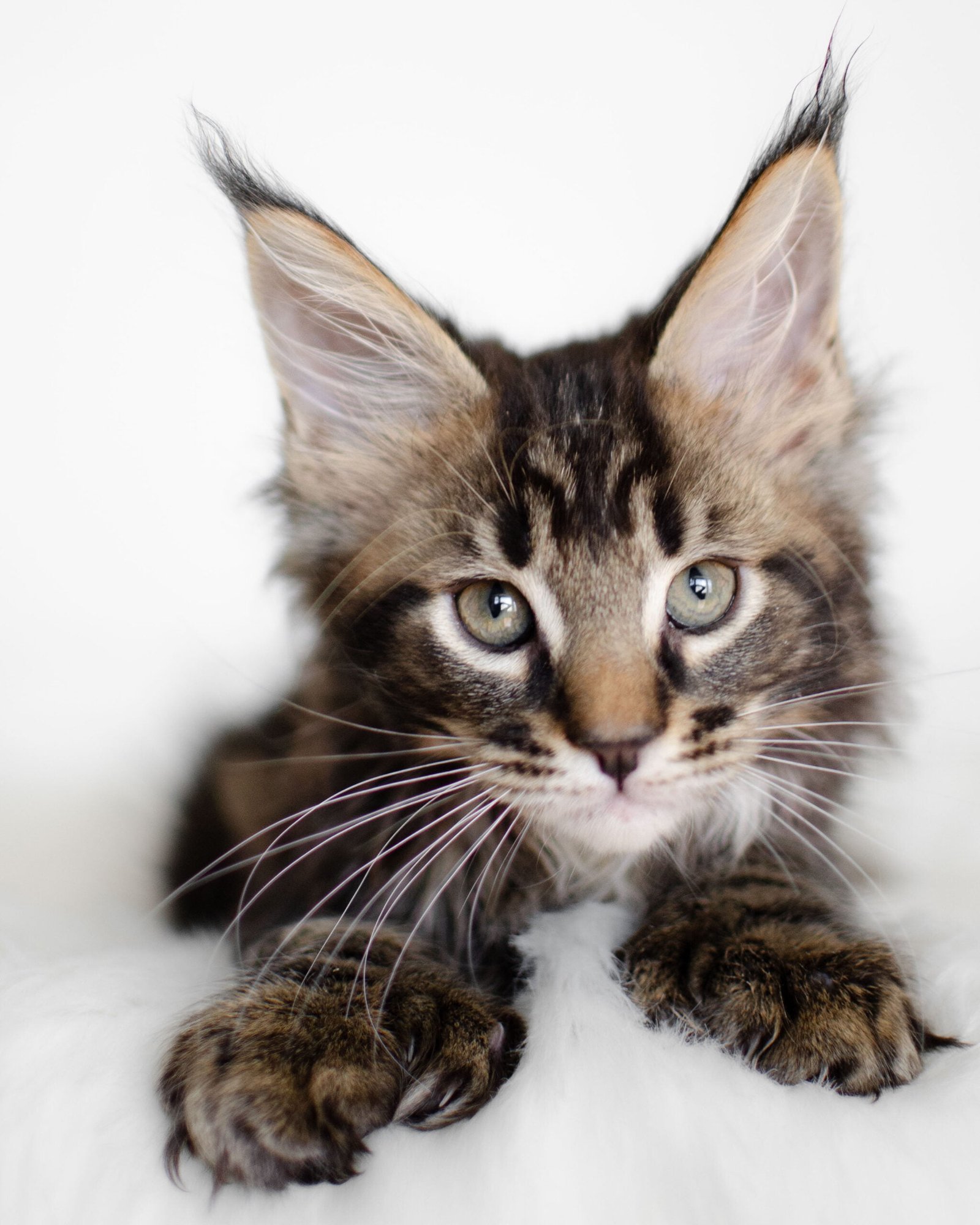
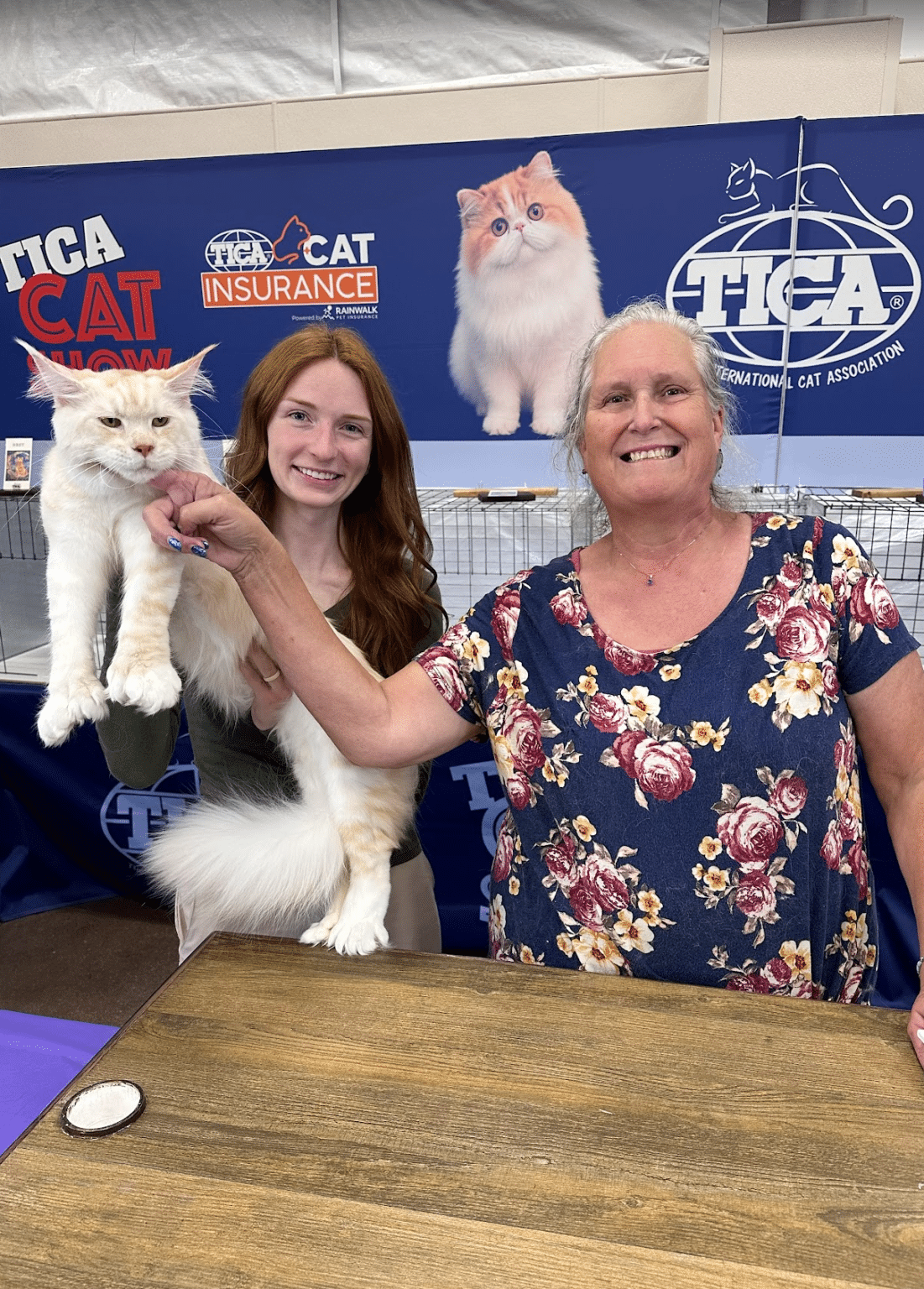
At Greek Garden Maine Coons, we are proud to uphold the highest standards of care, ethics, and education in breeding. Here’s a little about us and why we are confident in our ability to responsibly raise Maine Coon kittens:
Health-First Breeding Program
Focus on Ethical Breeding
TICA Cat Club Founder
Commitment to Education and Care
Transparency and Trust
We believe that breeding responsibly is about more than producing kittens—it’s about investing in their health, ensuring ethical practices, and sharing a lifelong love for the breed. If you have any questions about our program or qualifications, feel free to reach out—we’re always happy to share!
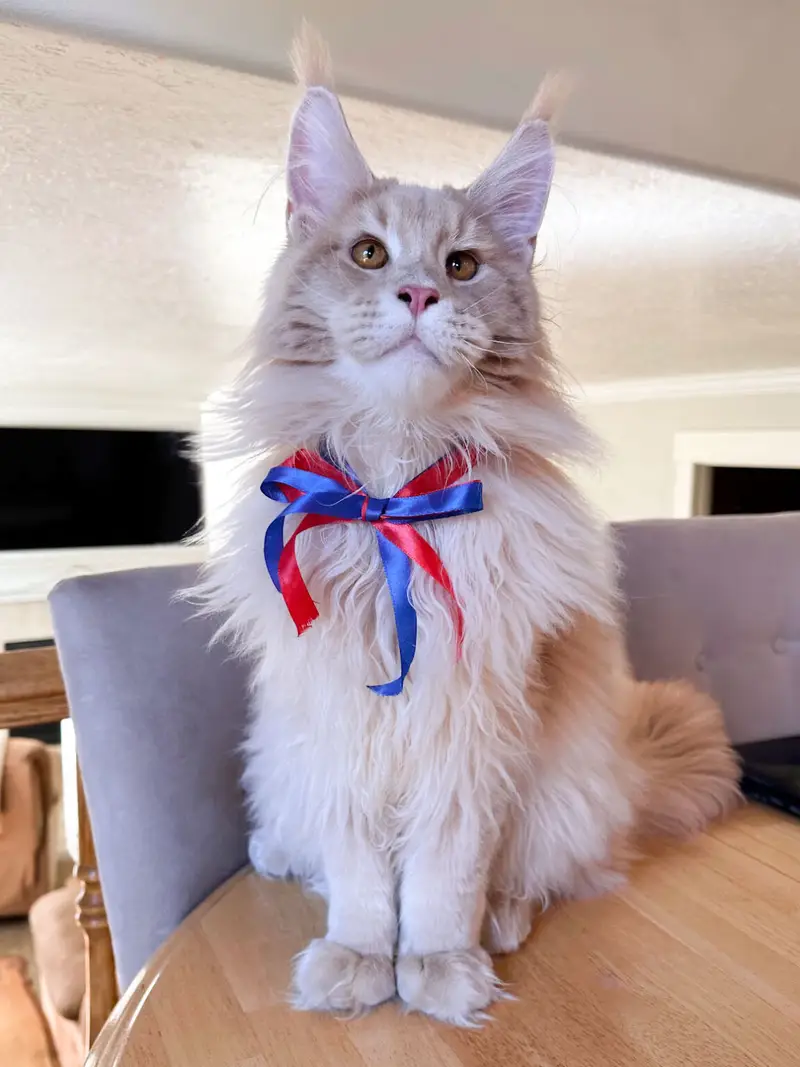
Common Health Concerns in Maine Coons
The Maine Coon breed is known for a few specific health issues, some of which are widely recognized and routinely tested for, while others are less common but still important to consider. The primary health issues include:
Polycystic Kidney Disease (PKD): A disorder that causes cysts to form in the kidneys, potentially leading to kidney failure.
Other Important, Less Commonly Tested Concerns
While these issues may not be as widely screened for, they are still relevant to the Maine Coon breed and should be part of a responsible breeding program:
Infectious Diseases: Like all cats, Maine Coons can contract Feline Leukemia Virus (FeLV) or Feline Immunodeficiency Virus (FIV) if exposed.
Health Testing Matters for All Cats
It’s important to note that while these issues are more commonly associated with Maine Coons, they are certainly not exclusive to the breed. For instance, some studies suggest that Hypertrophic Cardiomyopathy (HCM) may actually be 2-5x more prevalent in shelter and domestic cats than in pedigreed cats like Maine Coons. The higher detection rates of health issues in Maine Coons and other breeds are often due to more consistent testing by ethical breeders.
Regardless of the breed, every cat intended for breeding should undergo thorough health testing. Ethical breeders prioritize the health of their cats and work to minimize the risk of passing on genetic conditions to future generations.
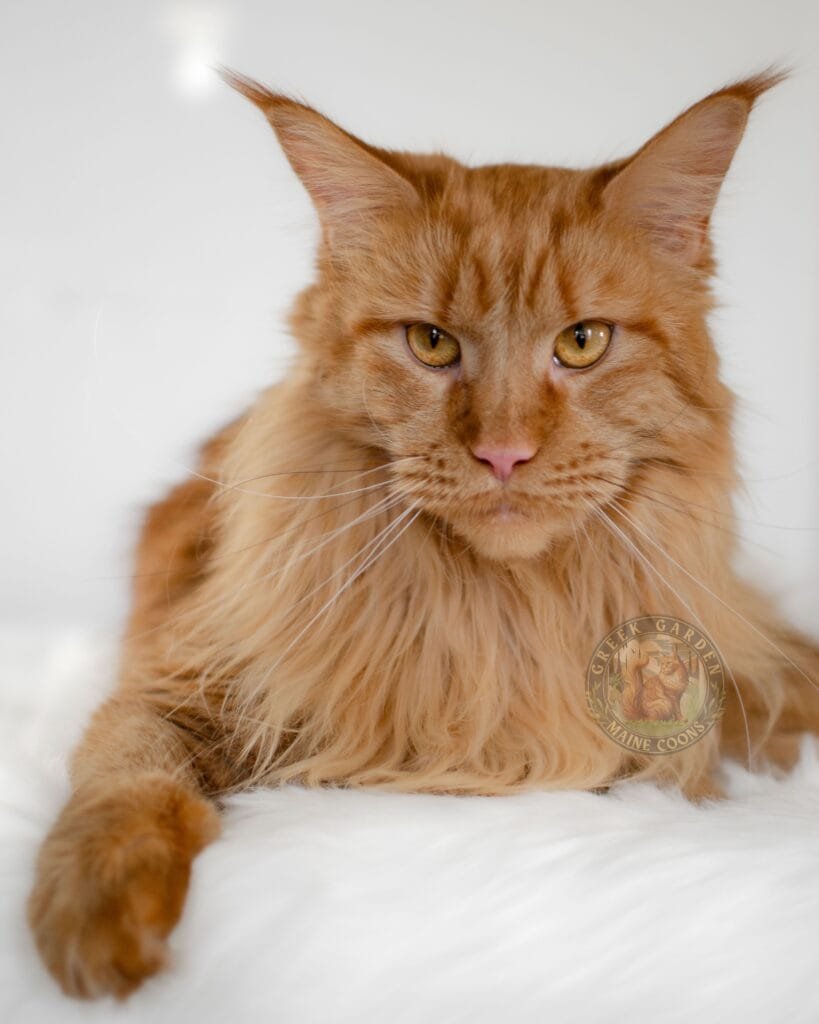
When selecting a Maine Coon breeder, the most critical factor to consider is their health testing standards for breeding cats. This is what separates a reputable and ethical breeder from a “backyard breeder”.
Unfortunately, not all breeders are transparent about their practices. Some “backyard breeders” may claim their cats are:
It’s crucial to understand that a genetic panel alone is never enough, especially for Maine Coons. While helpful as part of a comprehensive approach, it cannot replace the other essential testing required to preserve the breed’s future.
At Greek Garden Maine Coons, we adhere to rigorous health testing protocols to ensure the health of our cats and the breed as a whole. Here is the full scope of our testing:
Full Genetic Panels: testing for genetic traits such as HCM, SMA, PKD, PKDef, as well as about 50 others. Genetic makeup does not change throughout an individual’s lifetime, so this test can theoretically be performed on kittens as young as 1 minute old. Note that for issues such as HCM, there are more genes at play than labs have the capacity to test for, and the much more reliable testing is to perform annual heart echocardiograms on breeding cats. Think about it – you wouldn’t forego your personal annual wellness exams for a one-off genetic panel, would you? It certainly would not tell you as much about your immediate health.
In addition to the core tests above, we go beyond industry standards by performing the following:
Another critical aspect of responsible breeding is managing the coefficient of inbreeding (COI). Properly managing COI ensures genetic diversity and reduces the likelihood of hereditary health issues, which is essential for maintaining the long-term health of the breed.
Foundation line cats, which are outcrossed to domestic longhairs 4–7 generations back, typically have COIs ranging between 4% and 12%. Note that outcross breeding requires around a decade of breed and show experience, and is never as simple as just mixing a Maine coon with a domestic longhair. The “Maine coon mixes” seen on classified ads are, for all intents and purposes, “mutt” kittens and highly irresponsible to create.
For the general Maine Coon population, COIs should ideally remain below 10%. However, in many breeding lines today, COIs average between 15% and 20%, and sometimes up to 40%, which can increase the risk of genetic disorders in offspring. The primary goal in managing COI is to ensure that it decreases with each successive generation rather than increasing, and it is vital that COI is monitored in every cattery.
It’s also important to note that no true Maine Coon or domestic cat has a COI of 0% (a claim we sometimes see). Misinterpretations of pedigree databases sometimes lead to errors, such as neglecting to calculate the actual COI value. Responsible breeders take the time to evaluate pedigrees carefully and accurately to avoid these mistakes and prioritize the genetic health of their breeding program.
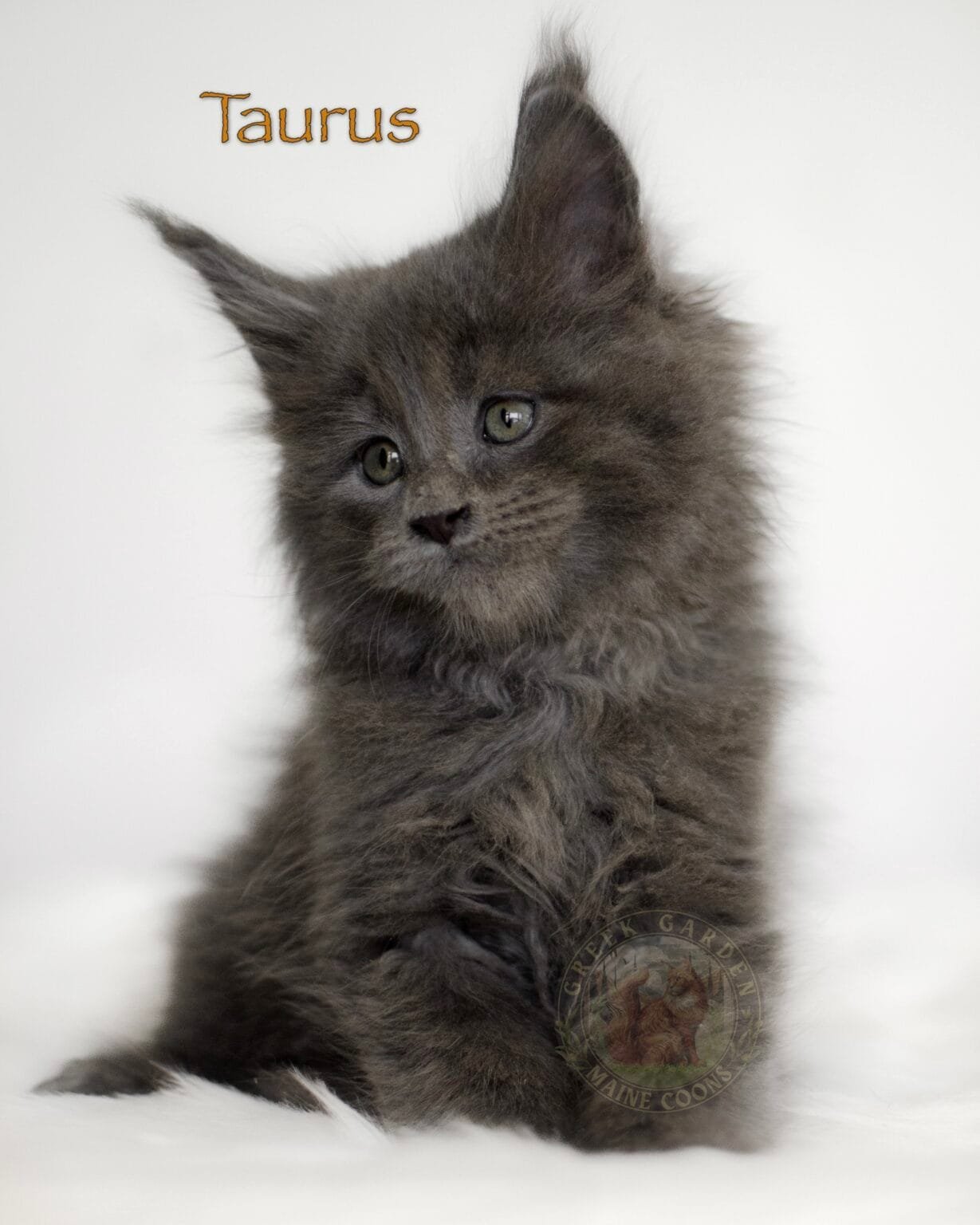
Because of their young age, kittens cannot undergo as much testing as adults, and kittens meant as pets typically do not need to anyways, unless they are exhibiting symptoms or are at higher risk because of parentage. While thorough health testing of the adults in our cattery substantially reduces the likelihood of matching issues in their kittens, we still test what we can in the kittens for the peace-of-mind it provides to you, the excited kitten-owner-to-be!
Health testing on our kittens includes:
They sure are!
We perform routine deworming on our kittens starting at 4 weeks of age, and each kitten receives two rounds of core vaccines – Purevax 3 Way – at weeks 8 and 11 or 12. Purevax is a bit pricier, but it is a recombinant vaccine which is considered one of the safests type of vaccines available. A third round of vaccinations at 16 weeks is recommended.
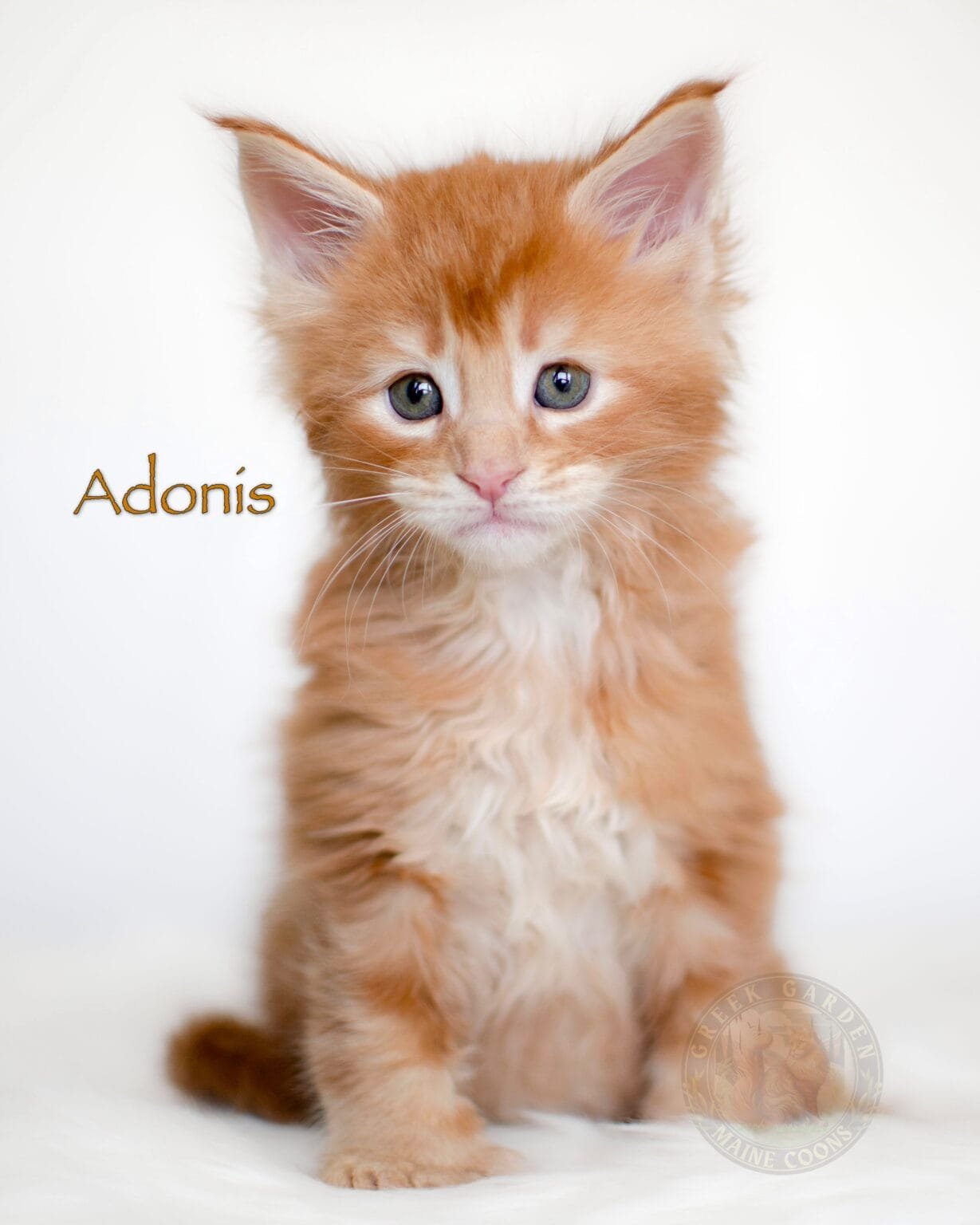
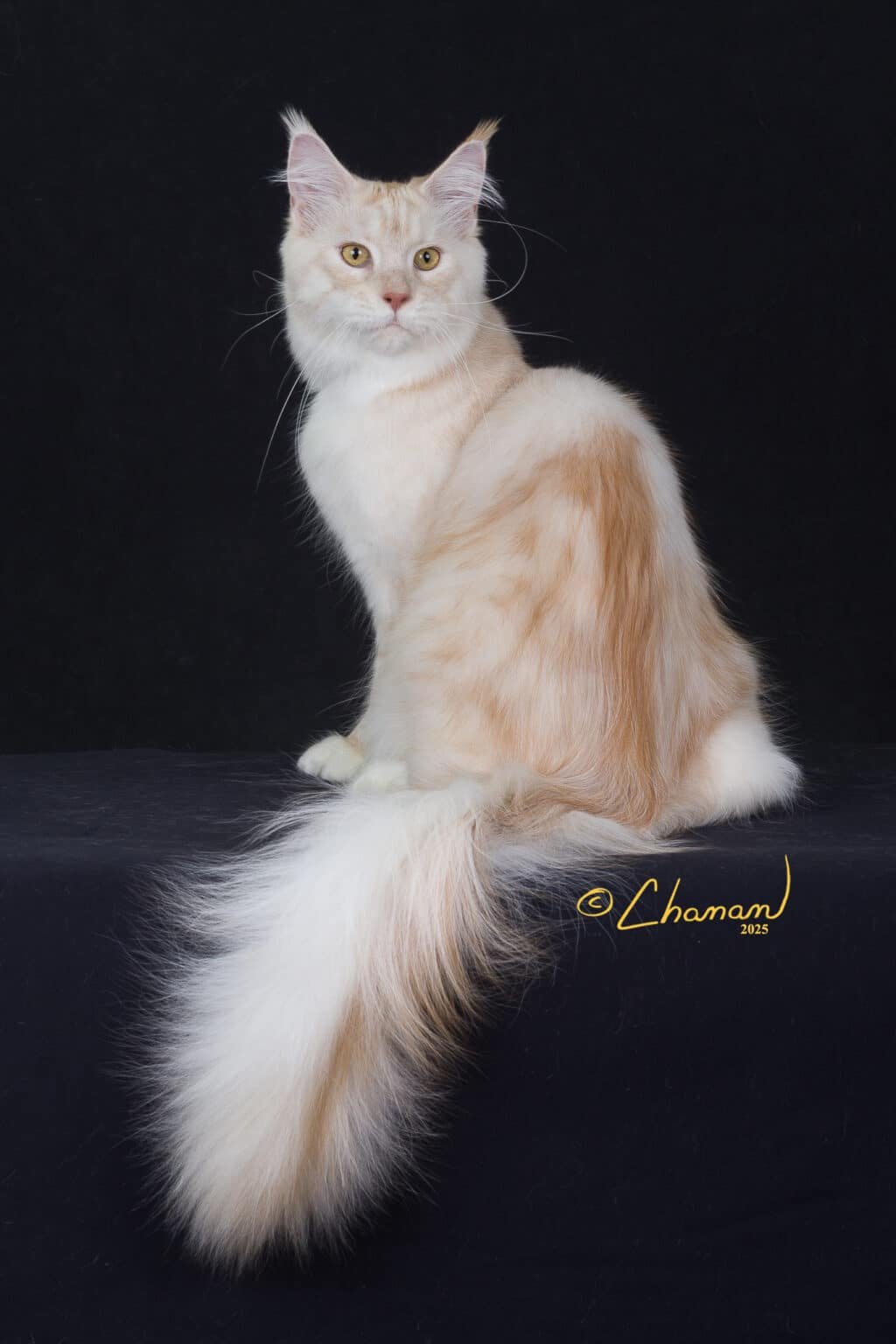
We are committed to the health and well-being of our kittens. To provide peace of mind to our adopters, we offer a 3-year genetic health guarantee against any life-threatening genetic or congenital conditions.
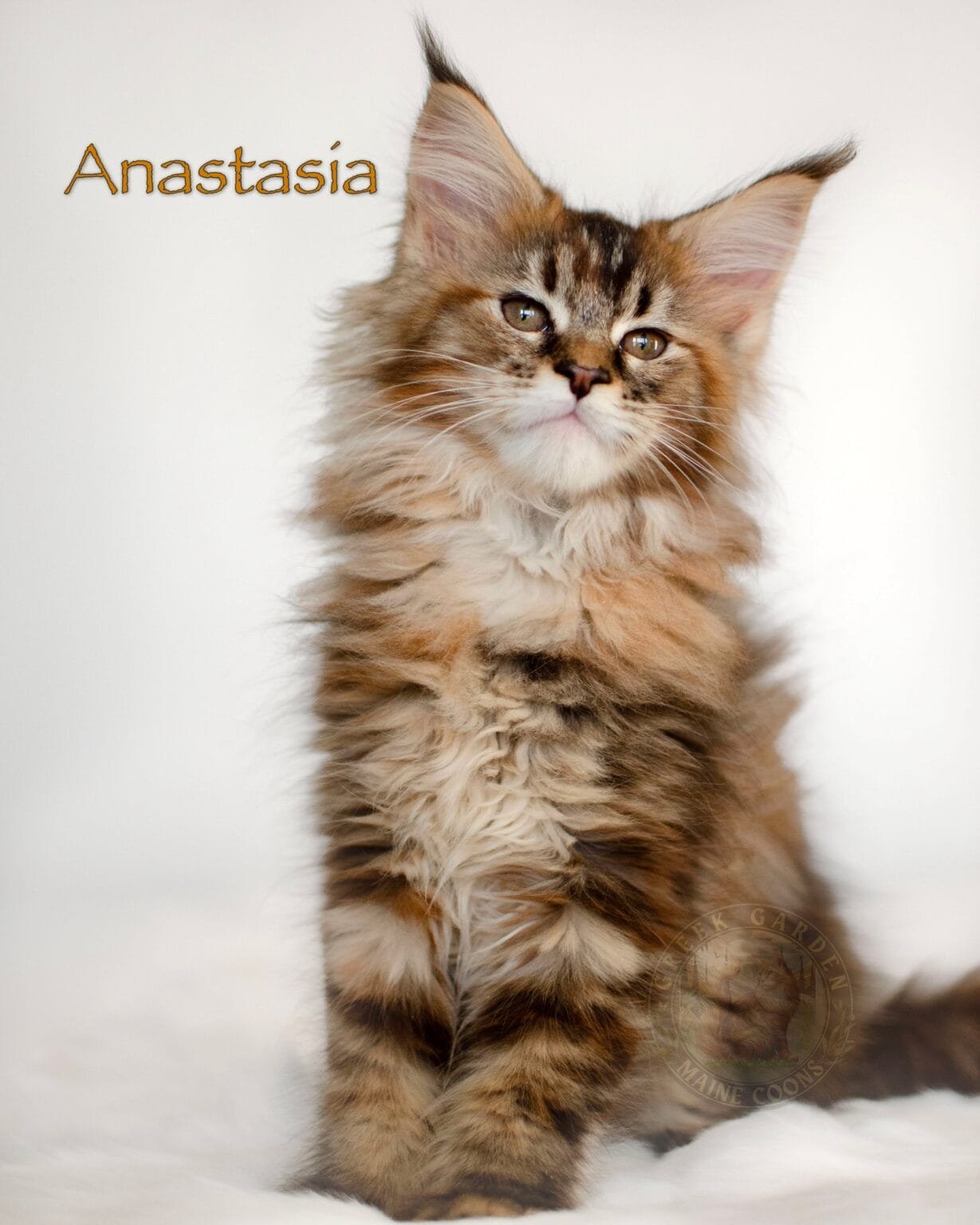
Ensuring the long-term health of our adult cats and kittens is one of our highest priorities. As mentioned in previous sections, our comprehensive health, structural, and genetic testing serves as the cornerstone for the overall well-being of our kittens. These rigorous measures provide a solid foundation for a long and healthy life.
We firmly believe that a happy cat is a healthy cat. That’s why socialization starts early in our cattery, helping kittens become accustomed to human interaction and fostering strong, loving bonds with their future families. This early social exposure plays a vital role in their emotional well-being and adaptability in new environments.
A cat’s diet, grooming, environment, and regular veterinary care all contribute to their long-term health and happiness. To assist our adopters, we provide a comprehensive kitten care guide with valuable information on proper nutrition, vaccination schedules, grooming tips, and more. Additionally, we are available 24/7 to the owners of our kittens, offering support and answering any questions that may arise throughout the lifetime of your Maine Coon.
Our goal is to equip you with the tools and knowledge to ensure your Maine Coon thrives in their new home and remains a beloved member of your family for many years to come.

At Greek Garden Maine Coons, we treat our Kings and Queens like royalty—because they are. They take turns sleeping in our bed, enjoy homemade cat-safe meals, and receive endless cuddles, playtime, and enrichment. Much of our spare time and resources are devoted to crafting or purchasing fun and functional furniture for them to explore. Unlike some breeders, we do not—and will never—house our cats in cages. Our Kings and Queens are cherished family members who share our home and hearts.
Our Kings typically have short breeding careers, most often lasting 2-4 years and beginning at a minimum age of 10 months, which is the earliest they can undergo official hip and heart testing. Male cats can sire significantly more kittens in a year than any single female can produce, and we believe that allowing a single male to father too many offspring is detrimental to the genetic diversity of the Maine Coon breed.
For this reason we are also cautious about “stud services,” where males are bred to a large number of other catteries’ females. Such practices dilute the gene pool and often disregard health and genetic integrity. For us, studding is a serious responsibility, not a casual offering.
To prevent this, we limit each King to a maximum of three stud breedings in their lifetime (if any), typically only with trusted cattery friends who adhere to strict breeding standards.
Our Queens generally have slightly longer breeding careers compared to our Kings, but we always retire them by the age of 5, ensuring they are spayed and enjoy the majority of their life as healthy, relaxed and beloved pets. We believe that 4–5 litters per Queen is sufficient and never exceed this limit.
Queens must meet specific criteria before breeding:
Maine Coon pregnancies typically last 63–70 days, or about 9–10 weeks. After giving birth, our Queens stay with their kittens to nurse them until they are 13–14 weeks old, when they are ready to go to their new homes. While the kittens nurse only for comfort beyond weaning at 4–5 weeks, the Queens enjoy regular breaks and are not required to spend all their time with the kittens.
Before allowing a Queen to mate again, we require that she has fully regained her pre-pregnancy health and weight, along with an additional reserve to support her next pregnancy. This recovery period in most cases lasts at least one to two months after kitten weaning, except in the case of rare “singleton” litters which are often bottle fed, as a single kitten does not usually provide enough stimulation for a mom cat to produce milk. For most Queens, this results in a minimum interval of around six months between pregnancies, except in the rare cases of singleton litters or litters where kittens were bottle-fed rather than nursed, which allow the Queen to recover much faster.
We follow the Merck Veterinary Manual* for our breeding practices, which provides critical guidelines for breeding cats in optimal health. It recommends sequential breeding as much as possible without skipping many cycles, provided the female has returned to optimal health, to minimize reproductive health risks like cystic endometrial hyperplasia and pyometra. This also allows the Queens to retire much younger, ensuring the majority of their life is spent as spayed cats unbothered by reproductive hormones. Our Queens are spayed by age 5, often earlier, but never later.
*Please be advised that this medical link includes images of feline and canine reproductive organs, which may not be suitable to all audiences.
While we initially believed that skipping a high number of heat cycles (breeding every 12–18 months) was ideal, we quickly learned how dangerous and even cruel this practice can be. Unspayed and unneutered cats can begin to deal with hormonal stress, especially when left cycling without mating for long periods of time, and face an increased risk of reproductive cancers and infections the longer they remain intact. Cats are polyestrous animals, meaning they can go into heat multiple times a year, with cycles lasting up to two weeks and occurring every 2–3 weeks. This differs significantly from monoestrous dogs, which experience heat cycles only once or twice a year. We monitor each individual cat’s behaviors, and each cat’s career is carefully tailored to them so they can enjoy maximal time as a spayed/neutered pet without risking their health by breeding too frequently.
By adhering to these ethical and evidence-based practices, we ensure the health, happiness, and genetic integrity of our Kings, Queens, and their offspring, contributing to the hopefully better future of the Maine Coon breed.
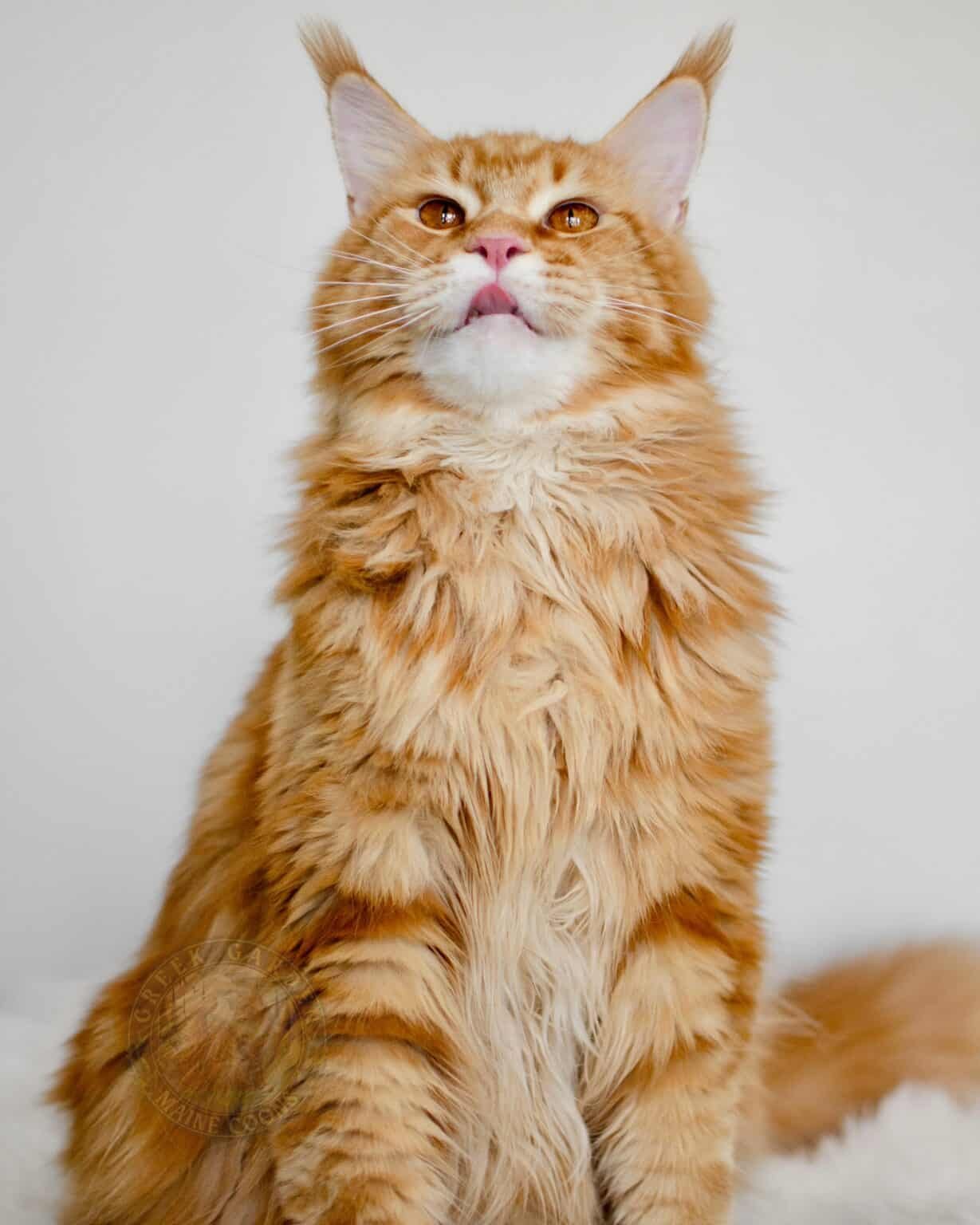
We take great care in selecting diets that provide optimal nutrition for our cats and kittens. Our feeding practices are strictly grounded in evidence-based research to prioritize their health, growth, and overall well-being.
While raw diets and grain-free foods have become popular in recent years, we do not recommend them. There is a very helpful guideline written by the World Small Animal Veterinary Association (WSAVA) that is definitely worth a read, for anyone considering raw diets. Raw feeding can expose cats to harmful bacteria such as Salmonella and E. coli, as well as parasites, which pose significant risks to both the cat and the humans in the household. Please also refer to this veterinary source regarding the dangers of raw diets. Many companies claim to be able to control the level of bacteria in their raw meat, but without fail each one eventually seems to do recalls for contaminats, the largest most recent one being Viva raw in June 2024 for an outbreak of listeria. Realize also that almost none of these raw pet food companies directly test for parasites in their raw meat.
Grain-free diets have been linked to dilated cardiomyopathy (DCM) in cats and dogs, and grains themselves are not harmful; in fact, they often provide valuable nutrients like fiber and energy. Taurine, an essential nutrient for cats, tends to be substantially reduced or fully removed in grain free diets, resulting in a Taurine deficiency which contributes to the development of heart disease, among many other major health issues. Here is a source to read concerning the dangers of grain free diets.
For our breeding cats, who have high energy demands due to pregnancy, nursing, and their active lifestyles, as a staple we feed Purina Kitten Chow. This high-calorie diet meets their increased nutritional requirements, helping them maintain a healthy weight and overall condition. We also use this diet for our kittens to support their rapid growth and development. To complement their diet, we provide homemade cooked foods such as:
For spayed or neutered cats over the age of one, we recommend a maintenance diet such as Iams Indoor Weight and Hairball Care, which is specifically designed to support adult cats in a healthy, sustainable way. Alternatively, we advise owners to consult their veterinarian for personalized dietary recommendations, as every cat has unique needs based on their health and lifestyle. Remember that because Maine Coons are a large breed, they are often the victims of overfeeding abuse due to owners simply not knowing they are feeding too much. Carefully monitor your cat’s figure to prevent obesity and related health issues.
For all dry food, we recommend also creating a bowl of water and dry food (usually a ratio between 1:1 and 4:1 of water to food) to help with water intake. Many of our cats love this, even more than most canned wet foods. This bowl should not be left out for more than a couple of hours to prevent bacterial buildup.
By providing balanced, high-quality nutrition and avoiding unproven or potentially harmful diet trends, we ensure our Maine Coons thrive at every stage of their lives. If you have questions about transitioning your kitten to a new diet or maintaining a healthy weight for your adult cat, we are always happy to assist!
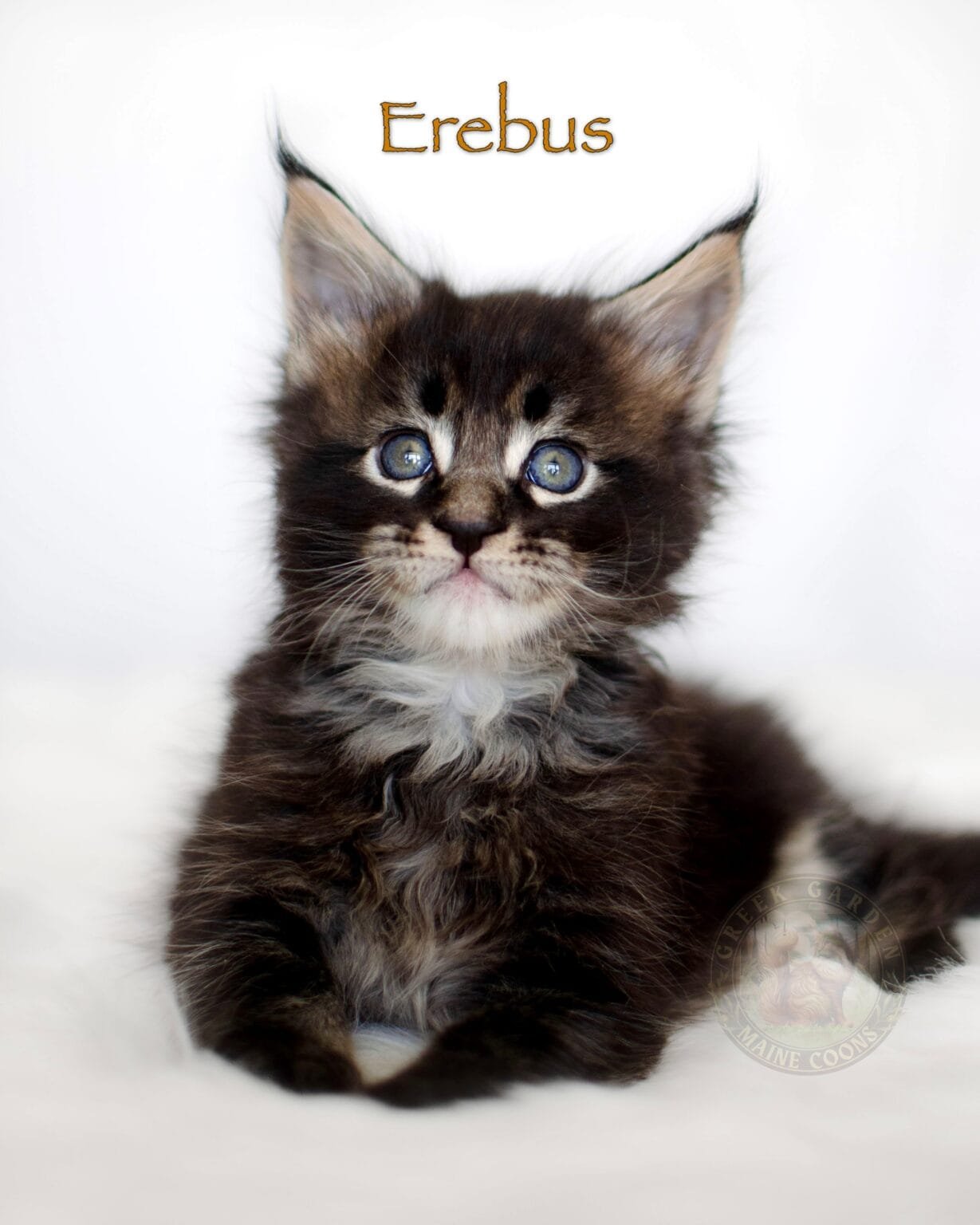
For kittens up to 4–5 months of age, we use natural pine pellet litter. This can be found for around $5-10/40lb bag at most farm supply stores. This natural, non-clumping litter is safe for young kittens who are still learning to use the litter box and may occasionally ingest small amounts of litter. Pine pellets are free of harmful additives and help minimize dust, making them a gentle and kitten-friendly choice.
Once our kittens reach 4–5 months of age, we transition them to plant-based clumping litter, which we use in our automatic litter boxes. Plant-based litter is biodegradable, dust-free, and gentle on a cat’s respiratory system. We prefer to use naturally fresh multi-cat walnut litter, but there are plenty of great alternitaves using ingredients such as corn, pine, wheat, coconut husks, and more. Its clumping properties make it convenient for cleaning, and it works well in automatic systems, providing a seamless experience for both us and our cats.
While clay and silica litters are popular, we avoid them due to the potential health risks they pose:
Clay Litter:
Silica Litter:
We recommend using natural, dust-free, and biodegradable litters, especially for kittens and cats with sensitive respiratory systems. For spayed or neutered adult cats, the best litter is one that aligns with their needs and preferences while ensuring safety and convenience for their owners.
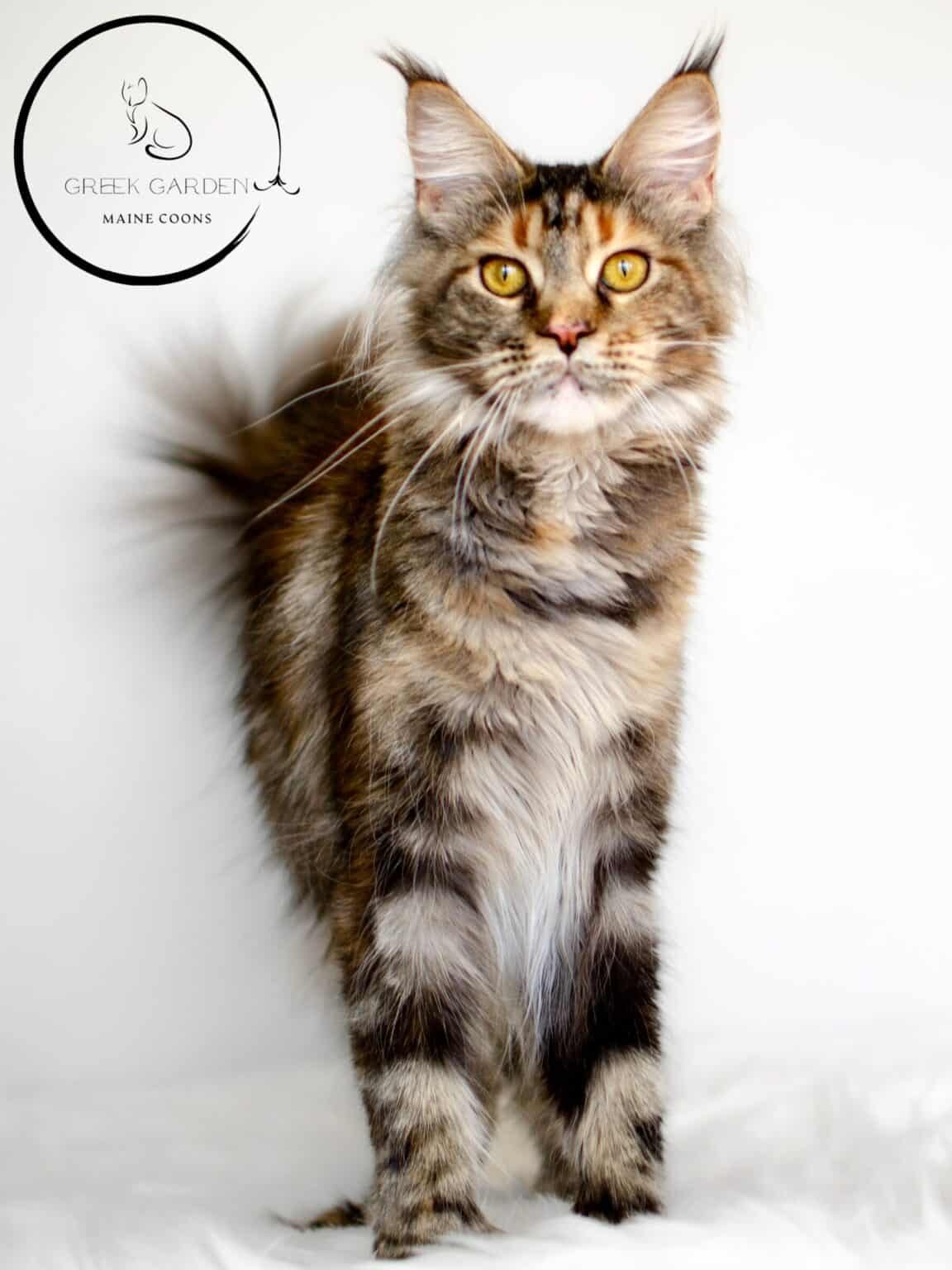
The health, happiness, and well-being of our cats are our top priorities. While we would love to keep all of our retired adult and teenage cats, including those that did not pass their health testing and could not become part of our breeding program, doing so would compromise the sustainability and ethics of our breeding program. To ensure we continue to improve the Maine Coon breed and maintain a healthy, genetically diverse breeding program, we occasionally rehome retired adults to loving families. This practice allows us to responsibly introduce new cats into our program and focus on enhancing the breed’s overall health and longevity.
Of course, some cats become so deeply bonded with us that they stay as family pets. We typically limit this to 1–2 beloved companions, although we admittedly struggle to stick to this limit—we love them all so much!
While we may have the resources and capacity to care for more cats (this is a full-time commitment for us), keeping too many cats together is not ideal for their health or well-being. Here’s why:
Domestic cats (Felis catus) are descended from the African wildcat (Felis silvestris lybica), a species that evolved as solitary hunters. While domestic cats have adapted to live in groups when resources like food, water, and shelter are plentiful, they still retain much of their solitary nature. Cats in larger groups often experience stress, which can weaken their immune systems and make them more vulnerable to infections. In close quarters, illnesses—whether viral, bacterial, fungal, or parasitic—can spread rapidly, increasing the risk to all cats in the group.
Additionally, viruses that spread between cats can sometimes mutate, making them harder for the immune system to fight off. This is why we carefully manage our group sizes and provide environments that support the physical and emotional health of every cat in our care.
We house our cats in small groups of 2–4 and provide them with spacious, enriched environments (a minimum of 10′ x 10′, with plenty of vertical climbing and resting areas). Each space is outfitted with cat furniture, toys, beds, litter boxes, and an endless supply of fresh water and food. Every few months, we rotate the groups so the cats can experience new setups, which helps keep them mentally stimulated and engaged. One of these spaces is our spacious master bedroom, where the cats sleep on our bed, bask in the sunlight, and watch our dogs play in the backyard.
By responsibly retiring and rehoming adult cats, we can focus on providing the best possible care and attention for every cat in our program. Whether they remain with us or move on to a loving forever home, every one of our cats is treated as a cherished family member.
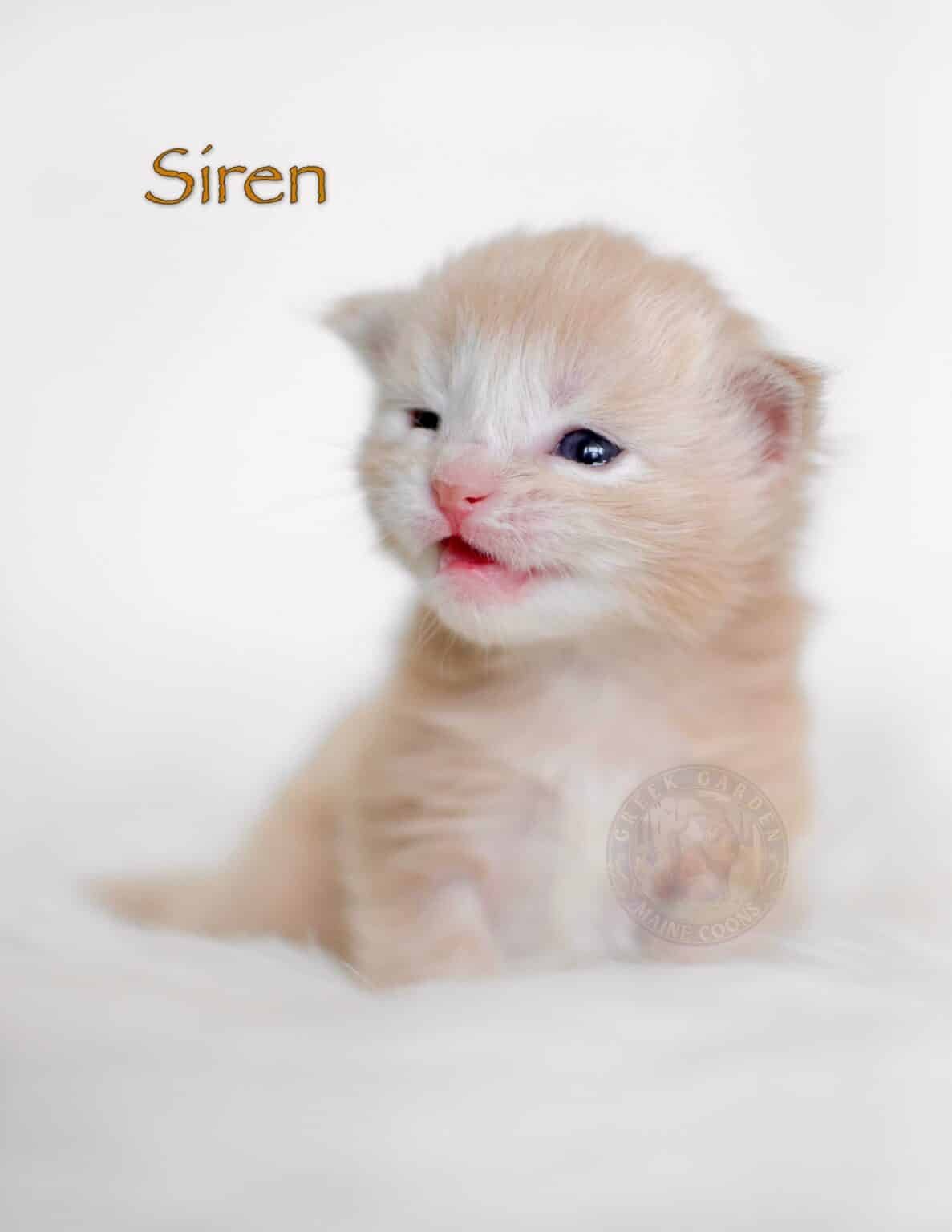
We no longer keep a waitlist. We publicly open applications when we have available kittens. Here are the steps to reserving a kitten:
1. Complete the Kitten Application
We understand this process requires patience, and we greatly appreciate your understanding as we work hard to place our kittens in the most loving, suitable homes.
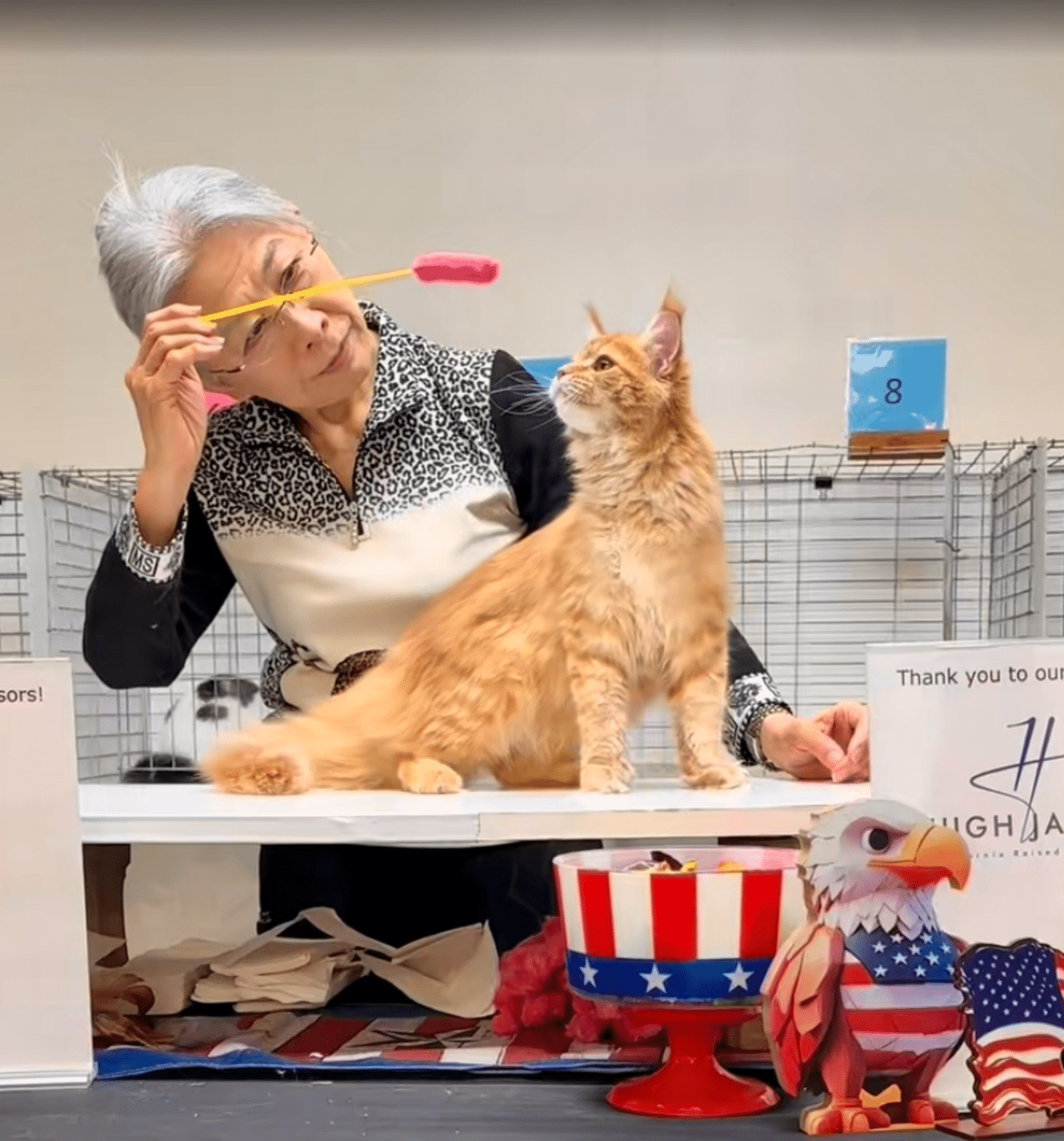
We deliver kittens anywhere within the continental United States and Canada! While we are located in Utah, the majority of our kittens have happily joined families across the country.
Pick-Up Options:
Personal Vehicle Delivery:
Personal In-Cabin Air Delivery:
At this time, we do not provide deliveries outside the US and Canada. However, if you live elsewhere and would like a kitten, you are welcome to fly to Utah, and we’ll meet you at Salt Lake City International Airport (SLC) for pick-up.
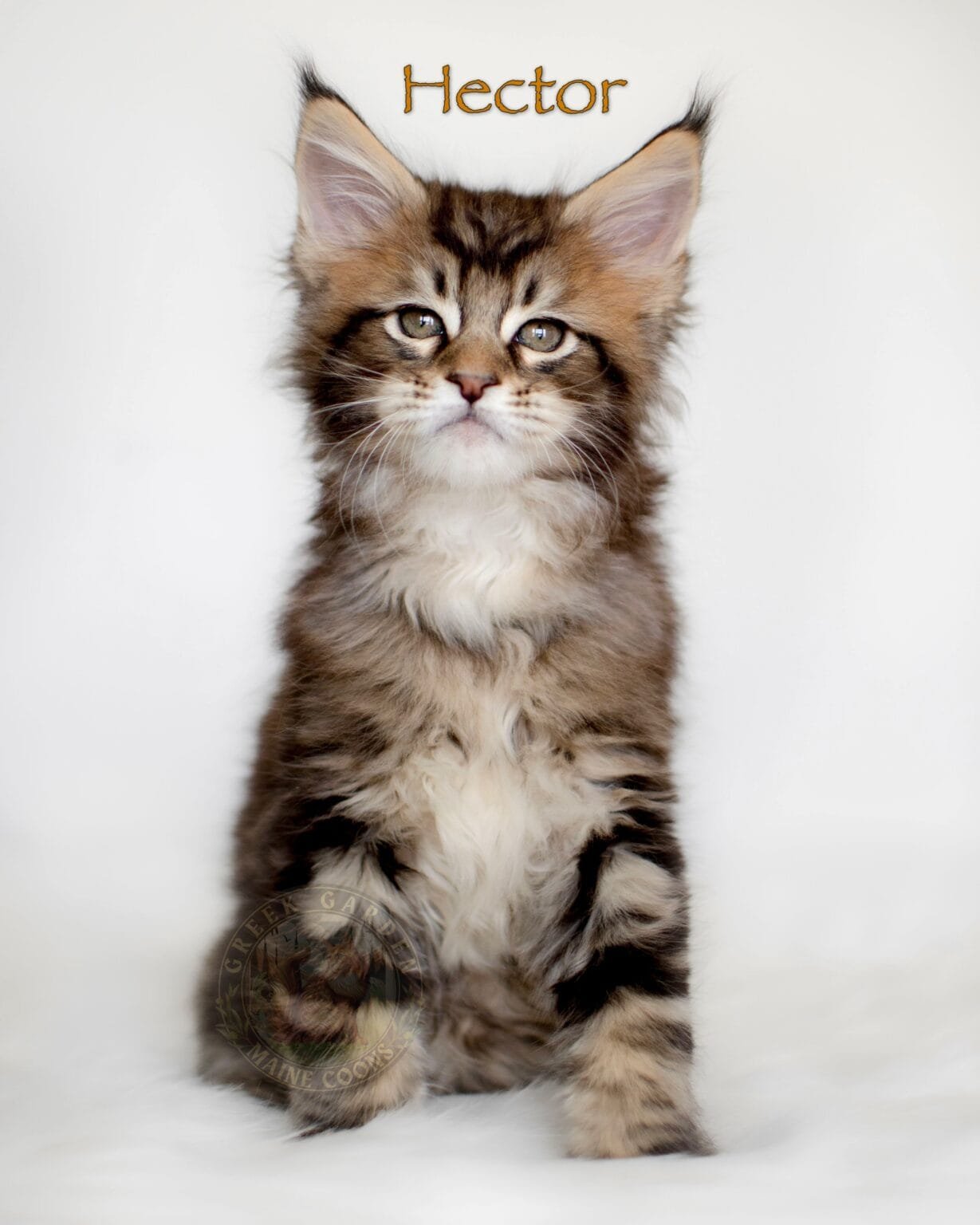
We completely understand—seeing a newborn litter of adorable Maine Coon kittens is exciting, and it’s tempting to reserve one right away! However, we do not allow reservations until the kittens are at least 8 weeks old.
Here’s why we wait until 8 weeks:
What Happens at 8 Weeks?
Once the kittens reach 8 weeks of age, we will:
Waiting until 8 weeks ensures we can:
We know the wait can be hard, but we promise it’s worth it! Our goal is to ensure each kitten is happy, healthy, and placed in the perfect home.
If you’d like to be notified when kittens are available for reservation, make sure you’re on our email list and follow us on social media for updates. Thank you for your understanding and patience!
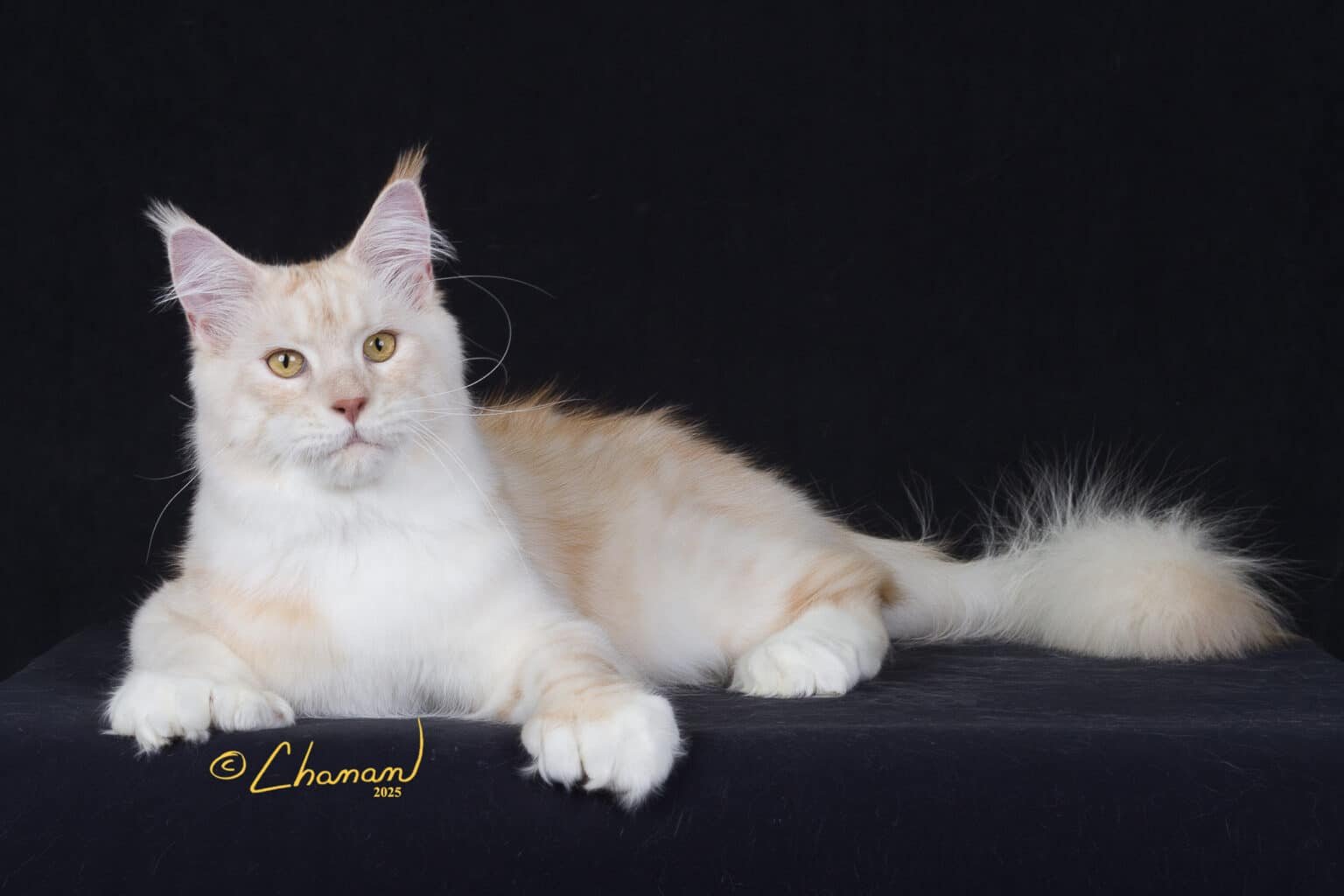
We want to make sure you don’t miss out when our kittens become available for reservation! Here’s how you can stay informed:
Join Our Email List
Follow Us on Social Media
Complete the Kitten Application
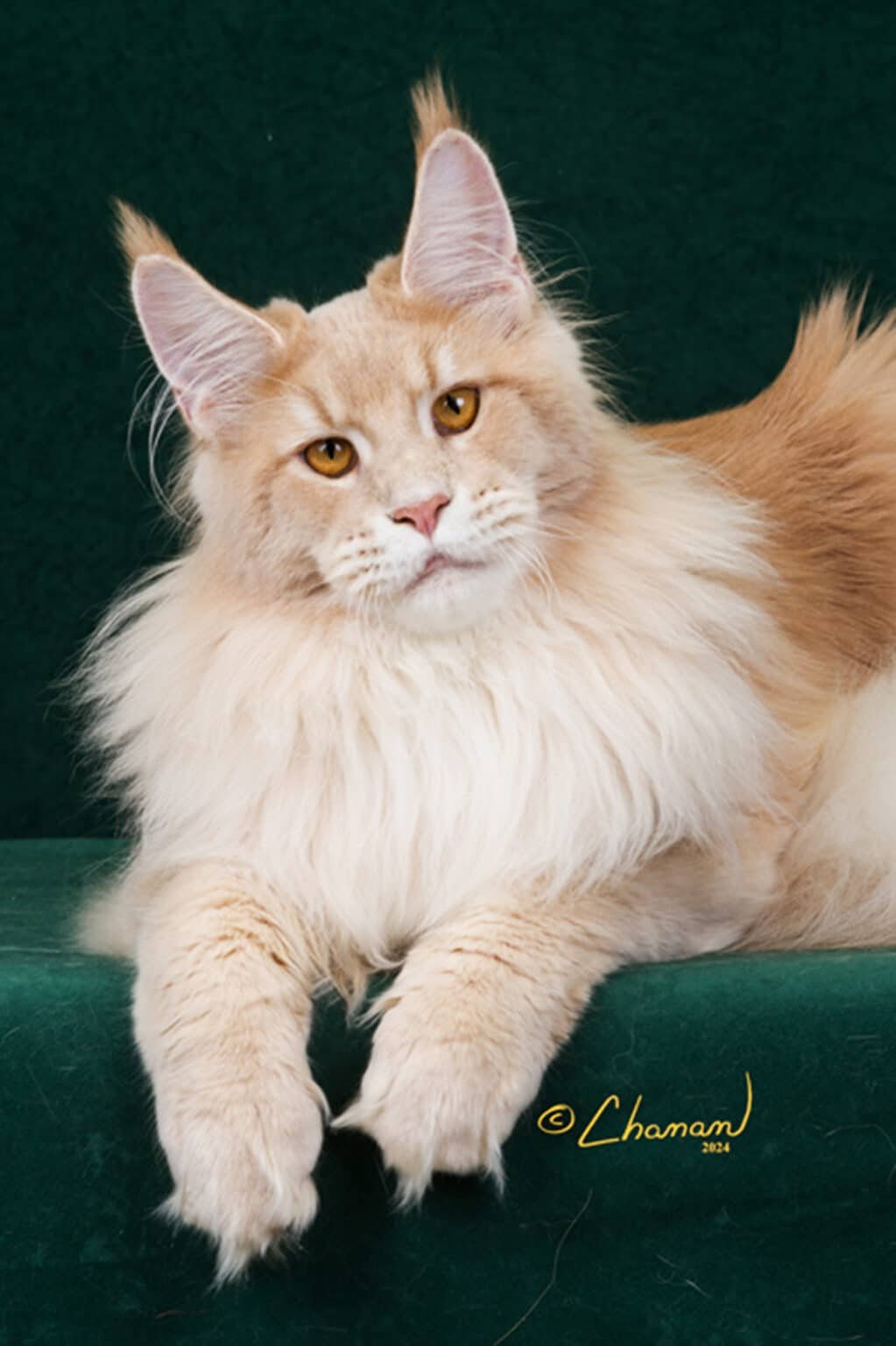
When Female Cats Retire:
Retired Males:
Spay/Neuter Included:
How to Stay Notified:
What Are Teenage Cats?
Spay/Neuter Included:
How to Stay Notified:
To ensure you don’t miss updates on retiring cats or teenage cats:
We love these cats dearly and take great care in finding them the perfect forever homes. Thank you for your patience and interest as we work to ensure the best possible match for each of our cats!
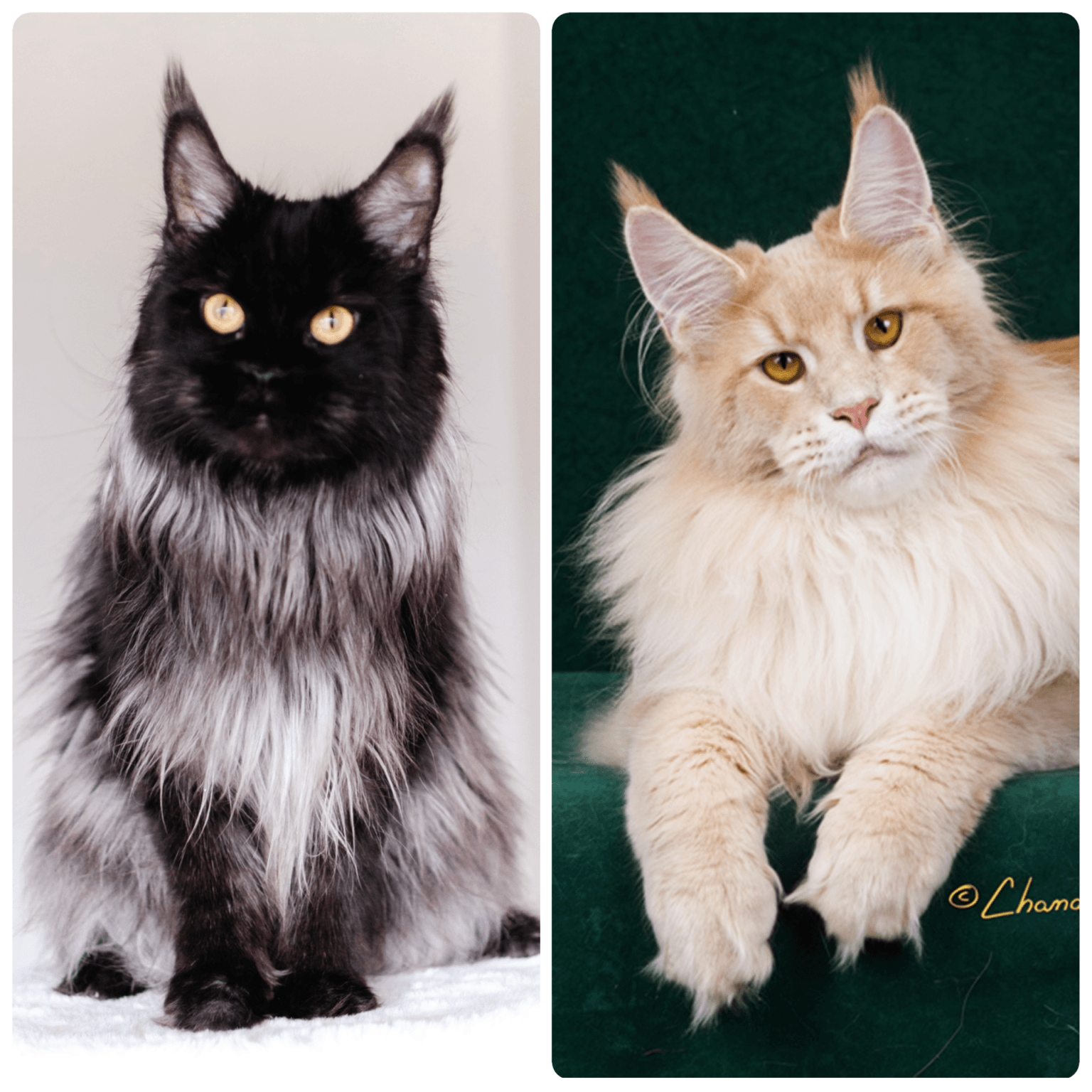
It’s difficult to provide an exact wait time for our kittens. Factors such as whether a queen becomes pregnant after mating and the size of each litter are beyond our control.
What Can You Do to Stay Engaged?
We encourage you to:
We understand the anticipation, and we promise that it’s worth it! Past kitten owners consistently tell us how thrilled they are with their new furry family members. While demand for our kittens far exceeds the number we can produce, we take great care to match kittens with the best homes possible.
Thank you for your patience and understanding as we work to place our Maine Coon kittens in loving homes!
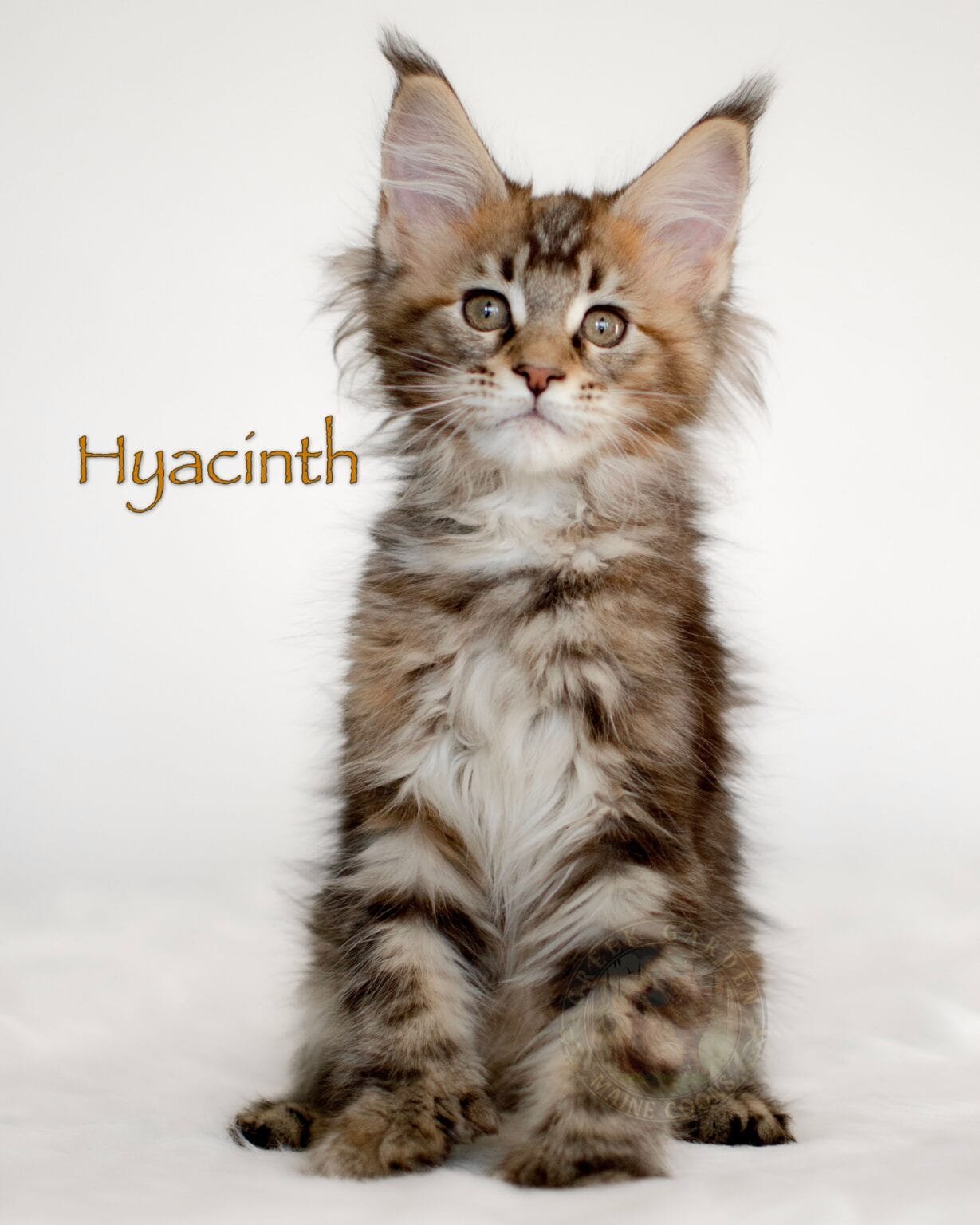
Our kittens are ready to go to their new homes between 13 and 14 weeks of age. Here’s why this timeline works best:
Spay/Neuter Surgery at 12 Weeks:
Final Vet Checkup at 13 Weeks:
Occasional Extended Stay:
Our priority is to ensure every kitten is healthy, happy, and ready to thrive in their new environment. Thank you for your patience as we prepare your new furry family member for this exciting transition!
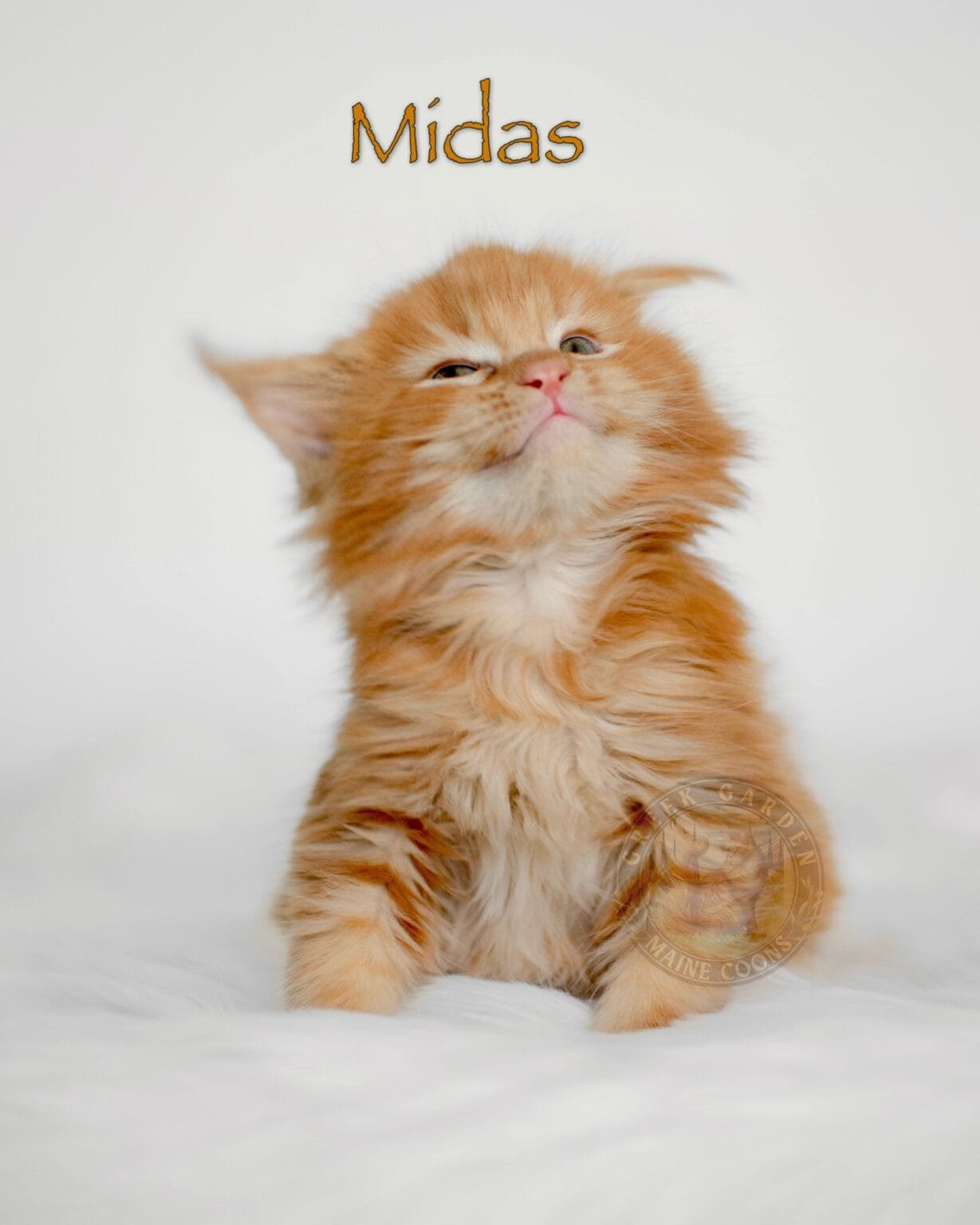
The answer to this is yes and no. While we do everything in our power to produce the healthiest kittens possible, some factors are beyond our control.
Even with our efforts, kittens may still encounter health risks outside of our cattery, such as:
To provide peace of mind, we offer the following:
We strongly recommend maintaining pet insurance, especially during the first two years of your kitten’s life. Young kittens are still developing their immune systems and may be more susceptible to unexpected illnesses or injuries. Pet insurance can provide financial peace of mind for unforeseen veterinary needs.
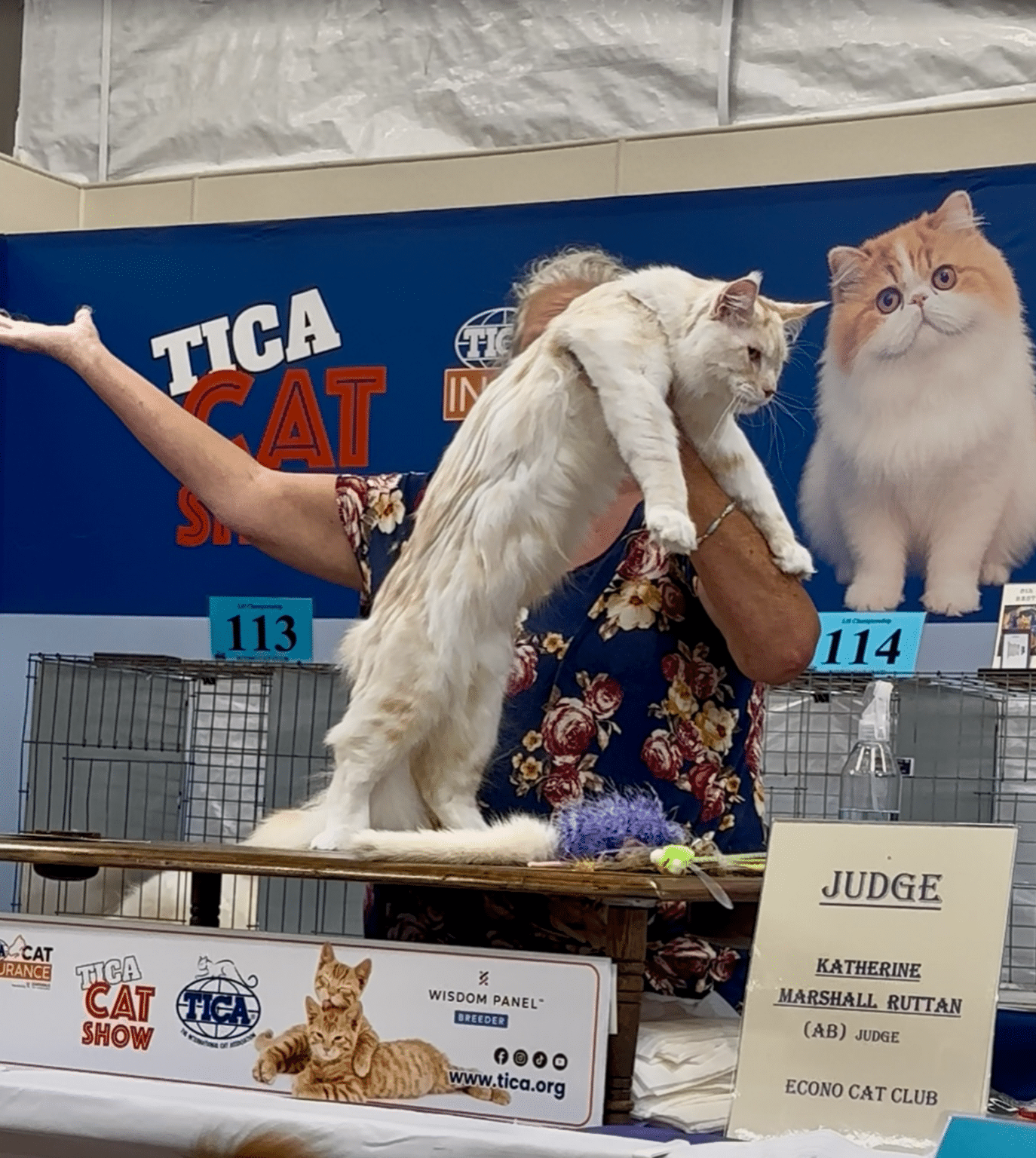
We completely understand wanting to visit the kittens in person, but unfortunately, we do not allow in-person visits at this time. This decision is made with the safety and health of our cats, kittens, and visitors in mind.
Protecting Kitten Health:
Security Concerns:
We appreciate your understanding as we work to keep both our kittens and our family safe. While virtual visits may not be the same as meeting in person, we promise to keep you involved in your kitten’s journey home!
Bonus: We do our best to attend TICA shows every few months at a minimum. If you are local to a show we will be attending and want to meet some of our cats, this is a great way to do it!
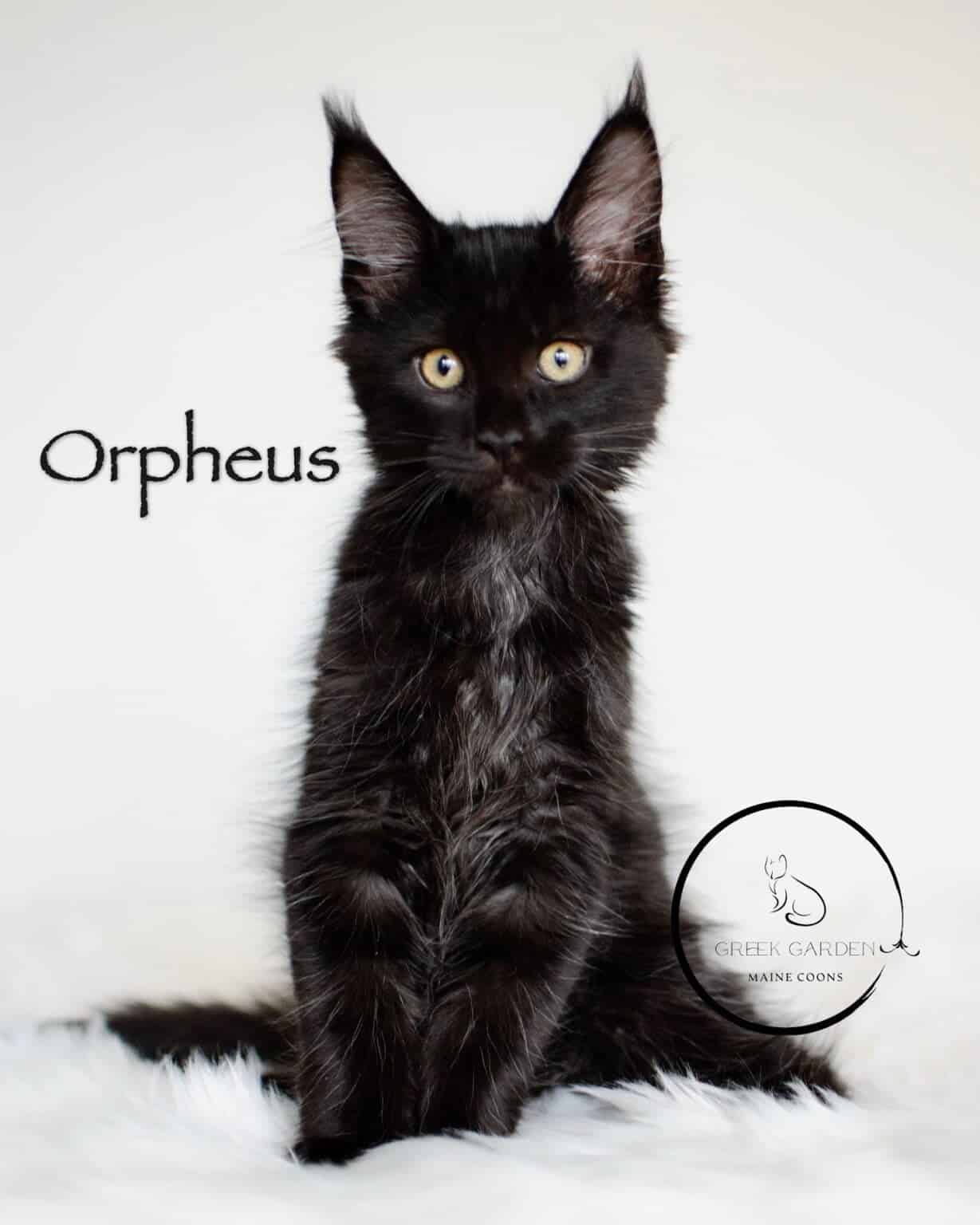
We completely understand that everyone has different views on spaying and neutering. However, at Greek Garden Maine Coons, outside of very special circumstances, all of our kittens are placed as pets only and are spayed or neutered at 12 weeks of age before going to their new homes.
Health and Safety:
Faster Recovery:
Population Control and Breed Preservation:
We often hear concerns about sterilization timing based on information about dogs, but it’s important to note that cats and dogs are biologically different:
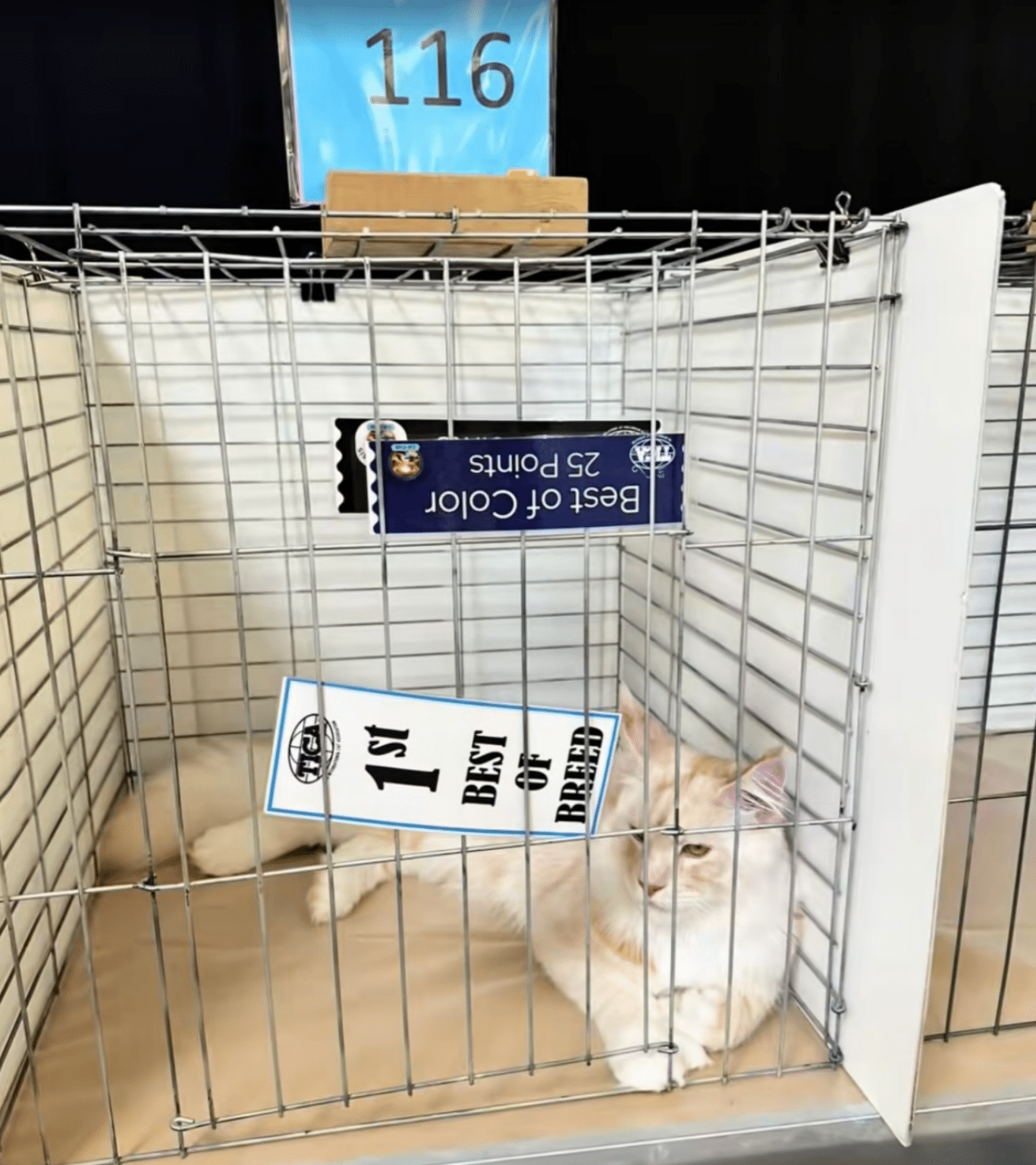
We are always happy to discuss your interest in breeding and encourage you to reach out to us directly to share your goals and plans. However, please note the following requirements:
Health and Ethical Standards:
New Breeders:
In the cat breeding world, there is an unspoken code of ethics:
Unfortunately, at this time, we do not have the spare capacity to mentor new breeders. This is why we limit breeding-quality placements to:
If you are serious about becoming a responsible breeder, we strongly encourage you to complete the PawPeds courses and reach out to us when you’re ready. We take great pride in placing our breeding cats with homes that are equally committed to preserving and improving the Maine Coon breed.
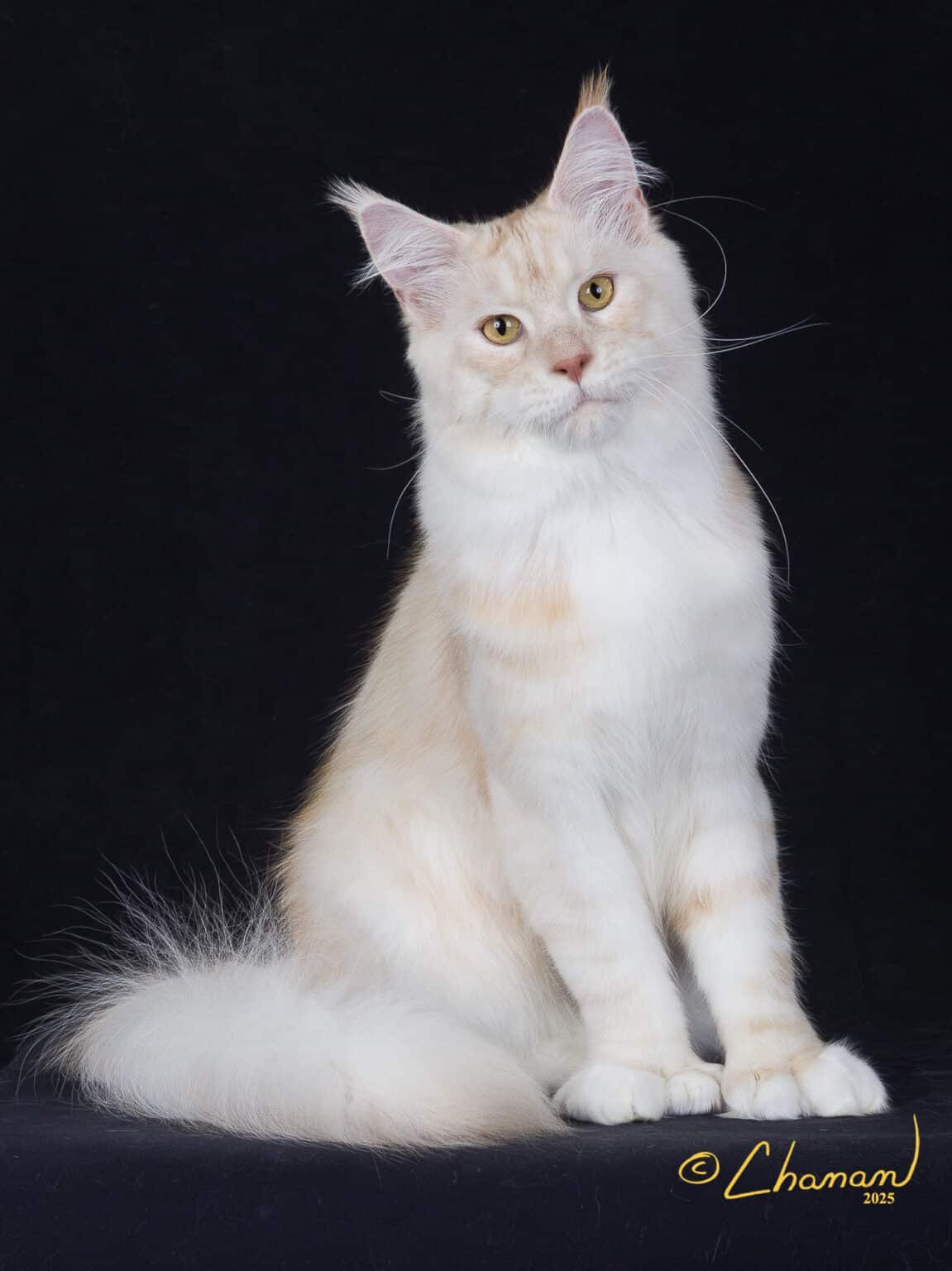
Price for All Kittens: $5,500
Kitten Reservation: After you have met us, your kitten, and your kitten’s parent, over a live video call (FaceTime, Zoom) following application selection, you will be sent our kitten contract to review. If you would like to reserve your kitten, the nonrefundable reservation fee is 50% of purchase price ($2,750), with the remaining balance due at pickup.
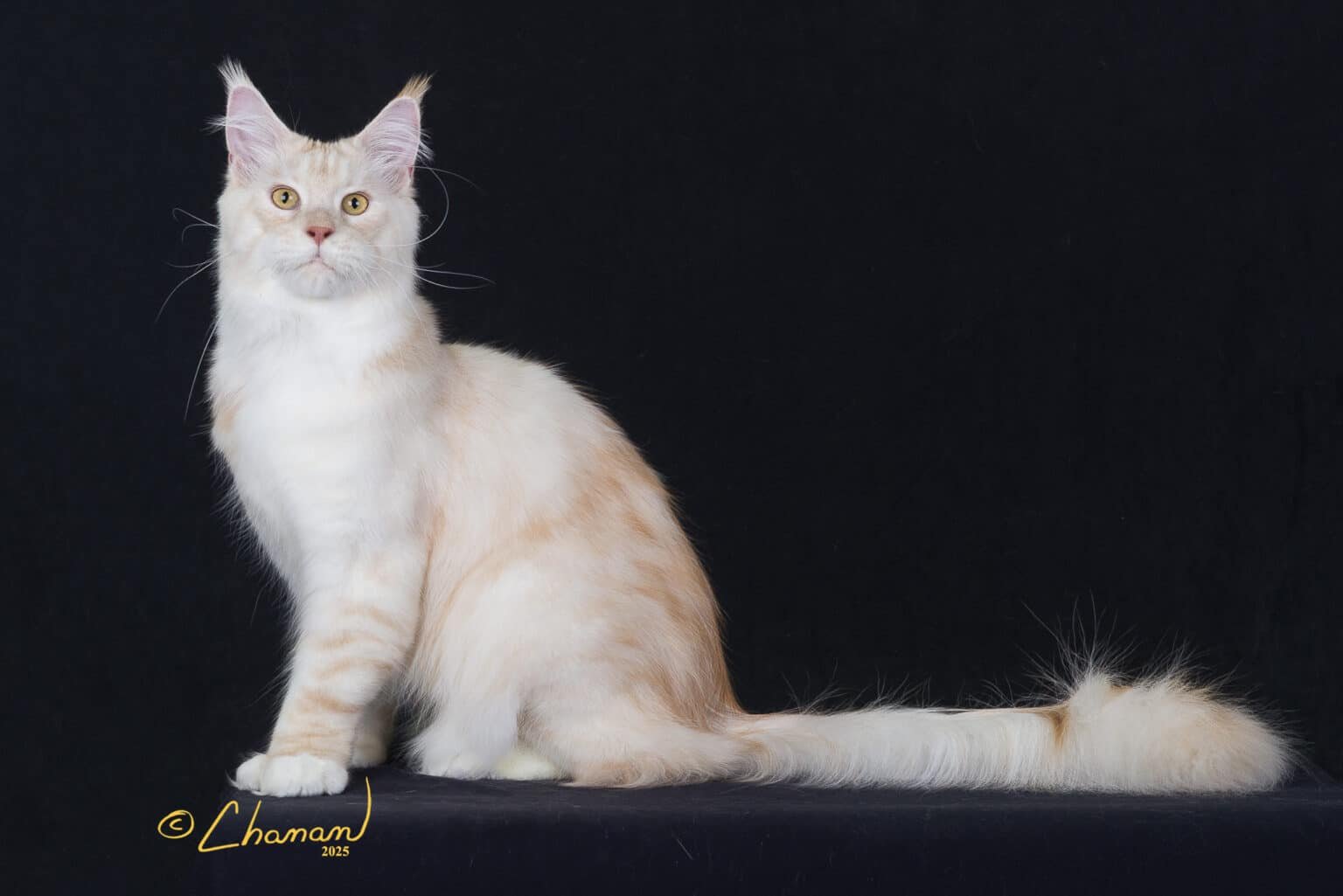
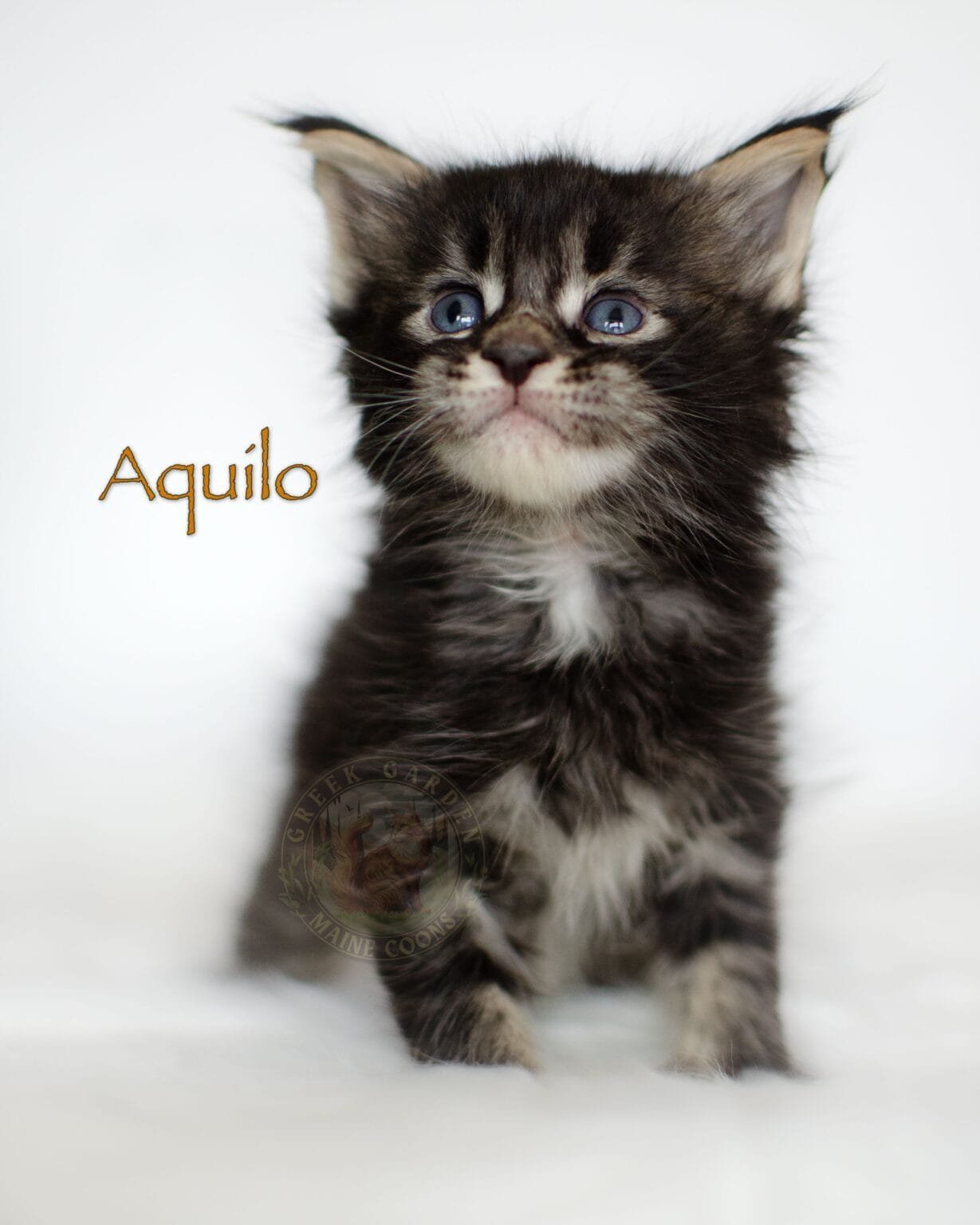
The reservation fee is always required up front to reserve a kitten. Typically, the rest of the payment is due at the time of pickup. If you prefer to pay your remaining balance in weekly or irregular installments, that is completely fine as long as the kitten is fully paid for before it goes home with you!
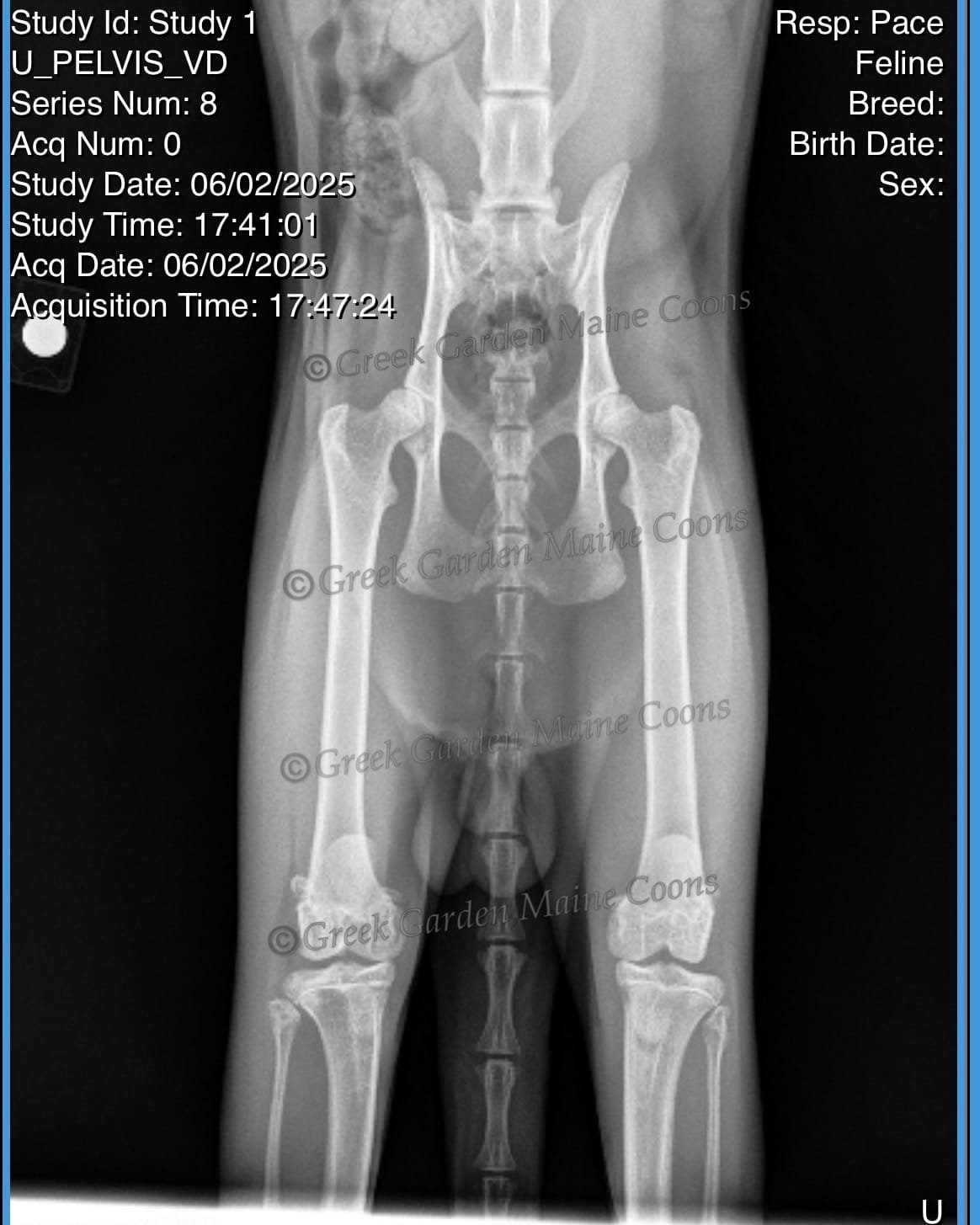
We understand that prices for Maine Coon kittens can vary significantly, and it’s natural to wonder why some kittens are priced lower than others. However, not all breeders follow the same standards of care, health testing, or ethical breeding practices.
Extensive Health Testing
Kittens from untested parents may cost less upfront, but they carry a much higher risk of expensive veterinary issues later in life.
Quality of Care
Ethical Breeding Practices
Long-Term Peace of Mind
While lower-priced kittens may seem appealing, they often come from breeders who cut corners on health testing, veterinary care, and proper socialization. This can result in:
When you choose one of our kittens, you’re not just paying for a pet—you’re investing in a healthy, well-raised companion from a breeder who prioritizes transparency, health, and ethical practices.
If you’d like more information about our testing, guarantees, or breeding program, we’re always happy to provide details. We believe that our kittens are worth the wait and investment and will bring years of joy to your family!
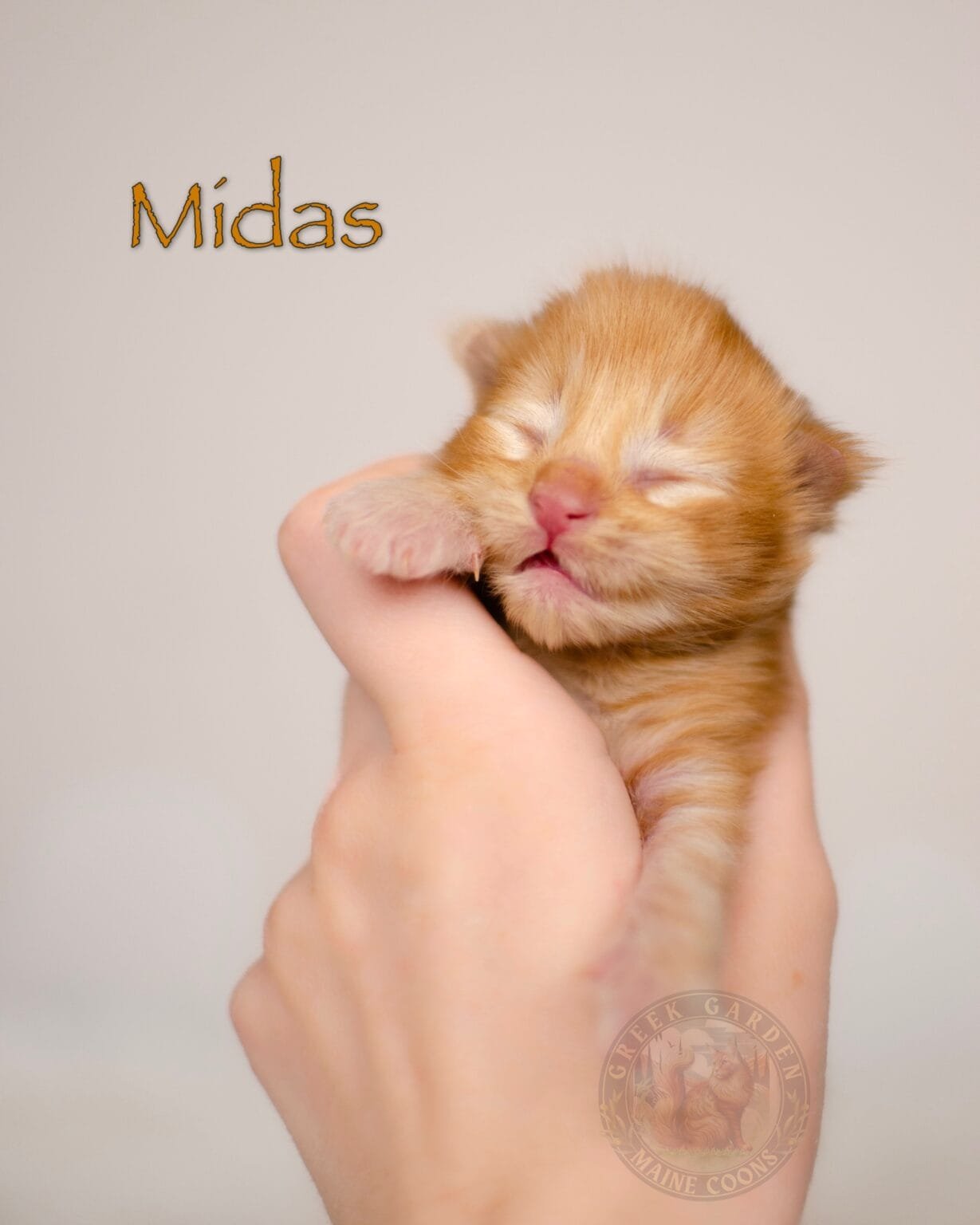
We understand the frustration—scammers, brokers, and backyard breeders often prey on potential buyers. Here are some key tips to ensure you’re working with a legitimate, ethical breeder:
Verify the Breeder:
Request Photos and Videos:
Beware of Low Prices:
Check for Health Testing:
Red Flags:
Confirm Certificates:
Ask Plenty of Questions:
Follow Your Gut:
Remember, a good breeder takes the time to screen potential owners and provide health guarantees for their kittens. If you’re unsure, ask for advice or double-check through reputable organizations.